Brooklyn Law Notes Fall 2022

Annual Fund
- Providing financial aid to every student who needs it
- Supporting our faculty to ensure excellence in teaching and research
- Investing in our dynamic educational programs and initiatives, including our clinics and other practice-oriented opportunities
Dean’s Message
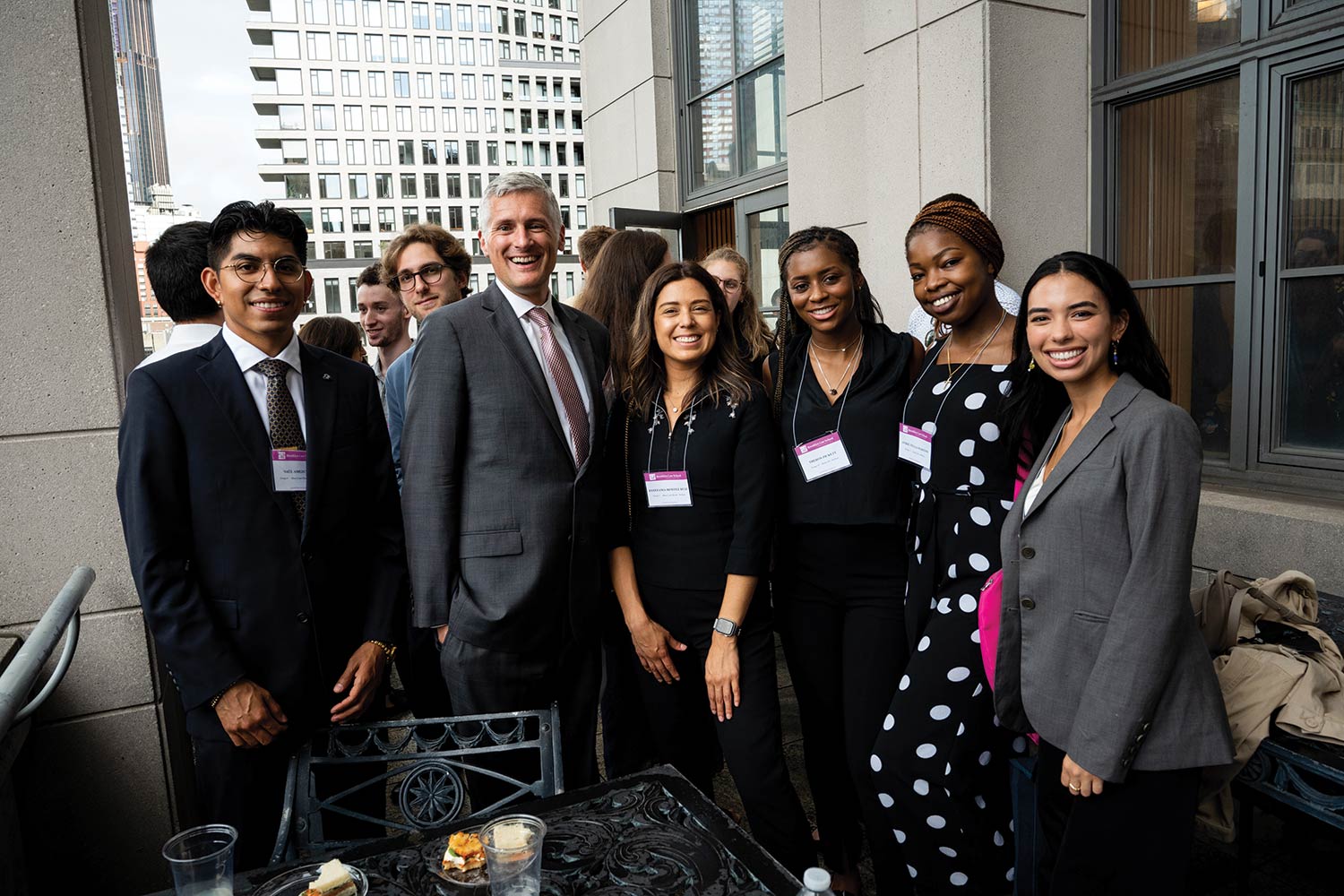
S MANY READERS likely know already, I announced over the summer that I will step down as dean at the end of this academic year. I have served during an especially challenging (albeit rewarding) time, and having held various administrative posts, here and elsewhere, for over a decade, it seems like a good moment to return to the faculty.
Looking back, I am very proud of all the progress the Law School has made on numerous fronts during my tenure as dean:
FACULTY. Certainly the most important and impactful legacy of my time as dean, in the short and long term, will be the outstanding additions to our faculty. The 18 full-time appointments, including 11 tenure-stream professors, have brought meaningful diversity to the faculty’s ranks and ensured the school’s ongoing vitality in the classroom, the scholarly community, and our wider society—building on historical areas of strength, such as evidence and securities, while adding expertise in areas of contemporary relevance, such as law and technology and election law.

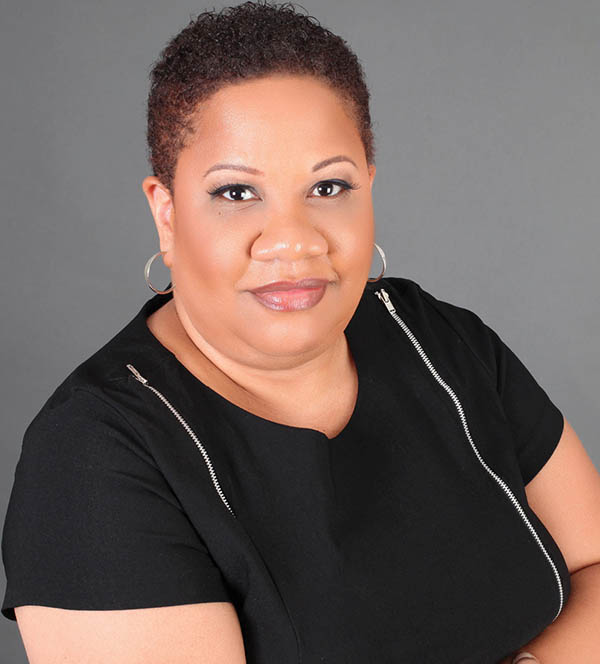
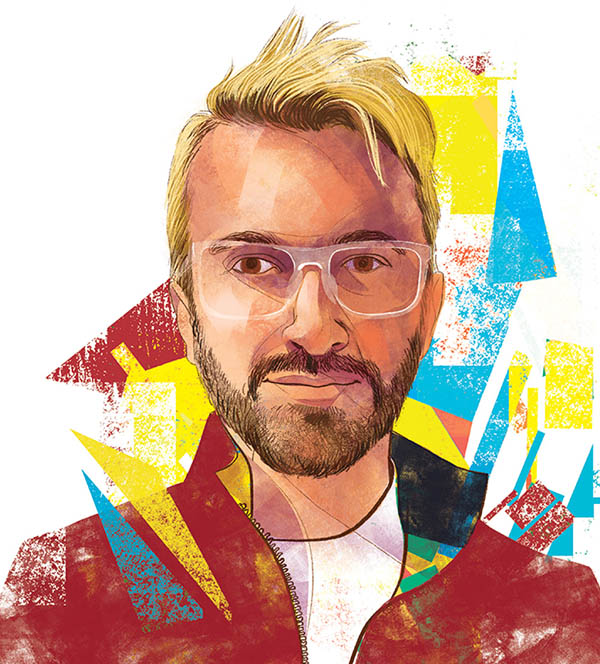
Director of Communications
Amy Schraub
Lisa Fleet Photography
Todd France
Savannah Lauren
Conor Sullivan
Joe Vericker
Celyn Brazier
John Jay Cabuay

Brooklyn Law School
250 Joralemon Street
Brooklyn, NY 11201


The incoming class enjoyed refreshments and light bites in the dining hall before the convocation program got underway.
Incoming Law School Class Receives Warm Welcome at Campus Convocation
THE BROOKLYN LAW SCHOOL campus brimmed with new faces Aug. 22, 2022, as a class of 411 students celebrated the start of their first year at the annual convocation.
The incoming class includes a mix of recent college graduates and those who migrated to law from a wide range of professions, including media, accounting, entrepreneurship, investment banking, not-for-profit organizations, and the military. Convocation speakers welcomed students to a thriving, tight-knit community.
“I hope you realize the students sitting next to you and whom you have met today are quickly becoming your friends, and they will become your colleagues, your support group, and eventually your legal network,” Vice Dean and Centennial Professor of Law Miriam Baer said. “We professors and administrators also like to think we are part of that network, because we are your mentors and often will be your strongest cheerleaders. But without question, your classmates are your greatest assets here at Brooklyn Law School.”
Commencement Day 2022 Celebrated With Family and Friends
The program featured remarks by Chairman of the Board of Trustees Frank Aquila ’83, and a speech by valedictorian Brian J. Fischer ’22, who was joined at the event by his grandfather Louis J. Castellano, Jr. ’49. The keynote speaker was Preet Bharara, former U.S. Attorney for the Southern District of New York, who was conferred the honorary degree of Juris Doctor Honoris Causa.
commencement speaker
(pictured in photo bottom left, middle)
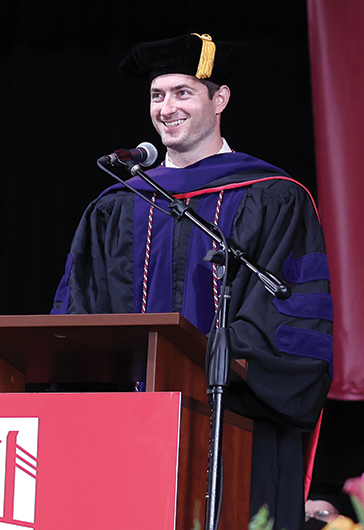
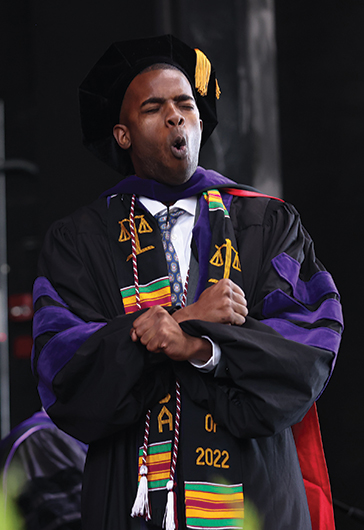
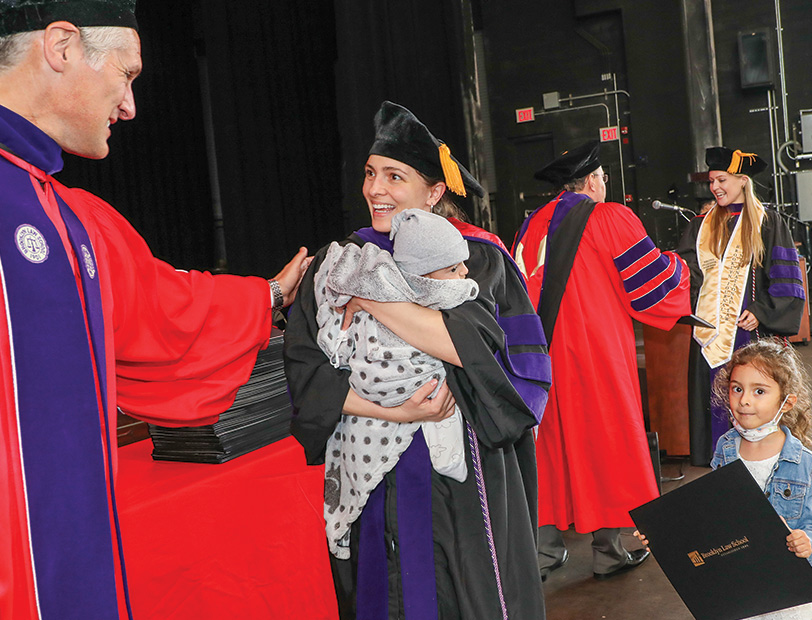
(pictured in photo above, left)
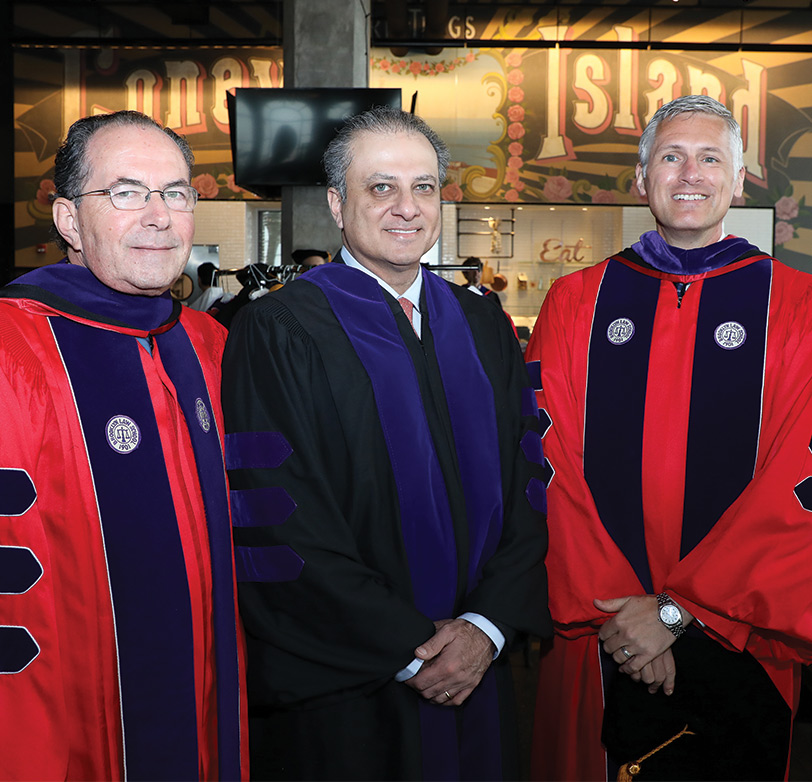
commencement speaker
(pictured in photo above, middle)
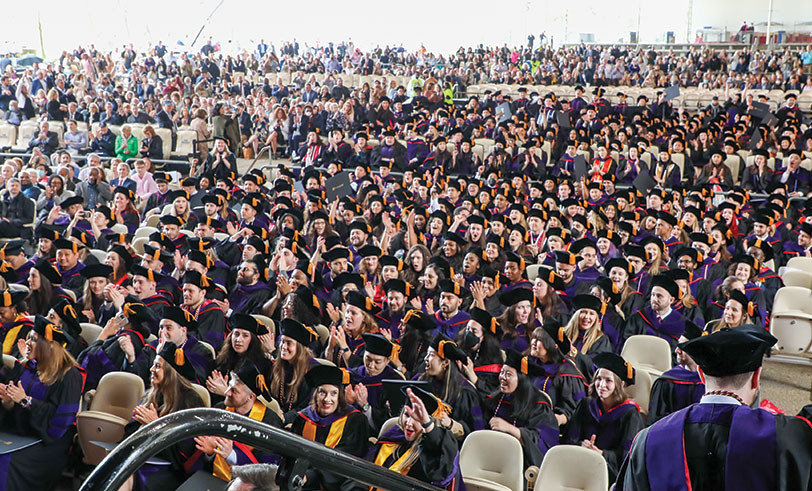
Vice Dean Miriam Baer Keeps the Communication Lines Open
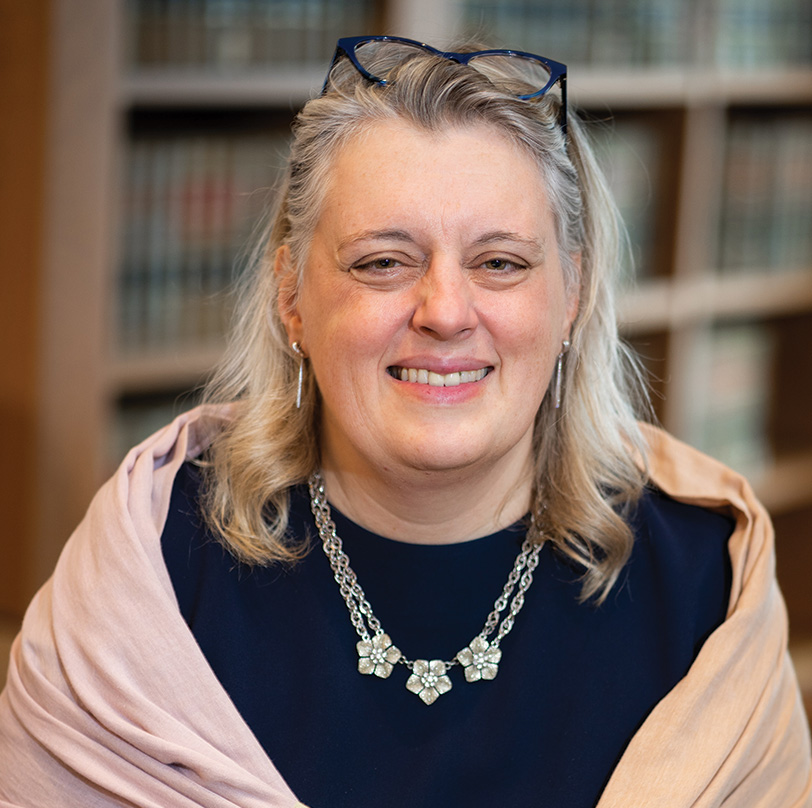
Miriam Baer
Yet the brimming schedule signifies that Brooklyn Law School is transitioning back toward a pre-pandemic era, in which Baer sees her mission as twofold: keeping the lines of communication open among students, faculty, and administrators, and being cognizant that although the pandemic is not over, the Law School needs an in-person experience that works for all.
“The most important mission now is to comfortably and safely bring us back into the building and back to in-person teaching, meetings, and events,” said Baer. “We all seem to learn more through our in-person interactions, and we enjoy our jobs more when we see and talk to each other.”
Baer has been gathering student feedback, positive and negative, to share with faculty. Likewise, she ensures students are aware of the latest wonderful faculty happenings. This year, she also hopes to see alumni and students take advantage of the rich programming at the Law School’s centers.
During her sabbatical, Baer was a visiting fellow at Harvard University’s Edmond J. Safra Center for Ethics, where she worked on her book, Myths and Misunderstandings of White-Collar Crime (Cambridge University Press), forthcoming in early 2023. She connected with scholars from different fields whose work touches on ethics, using their expertise to inform her scholarship on white-collar crime and its inherent ethical failures.
“What my book ultimately says is that we need to change our federal criminal statutes, which actually hide more than they convey,” Baer said. “They’re so broad in their creation—it’s not just that they cover a lot of conduct, but that they fail to distinguish variations of the same type of conduct, so we end up learning less about our enforcement and about the laws that are actually being violated than we could if we had clearer statutes and subdivided statutes.”
Some of the most blatant examples include fraud and obstruction of justice, Baer said. Changing the federal criminal code requires Congressional action, but, Baer said, criminal law reform is that rare agenda item with aisle-crossing appeal. “The only way to make reform possible in this area is to imagine it, discuss it, and promote it.”
Baer inherited the Centennial Professor of Law title and advice from her mentor and friend, 1901 Distinguished Research Professor of Law Roberta Karmel, now retired. “How do I make my students better off; how do I make the institution better off? When we tackle those questions as a group, recognizing the importance of collegiality and camaraderie, it all comes together,” she said.
Associate Dean Jocelyn Simonson to Promote Research and Scholarship
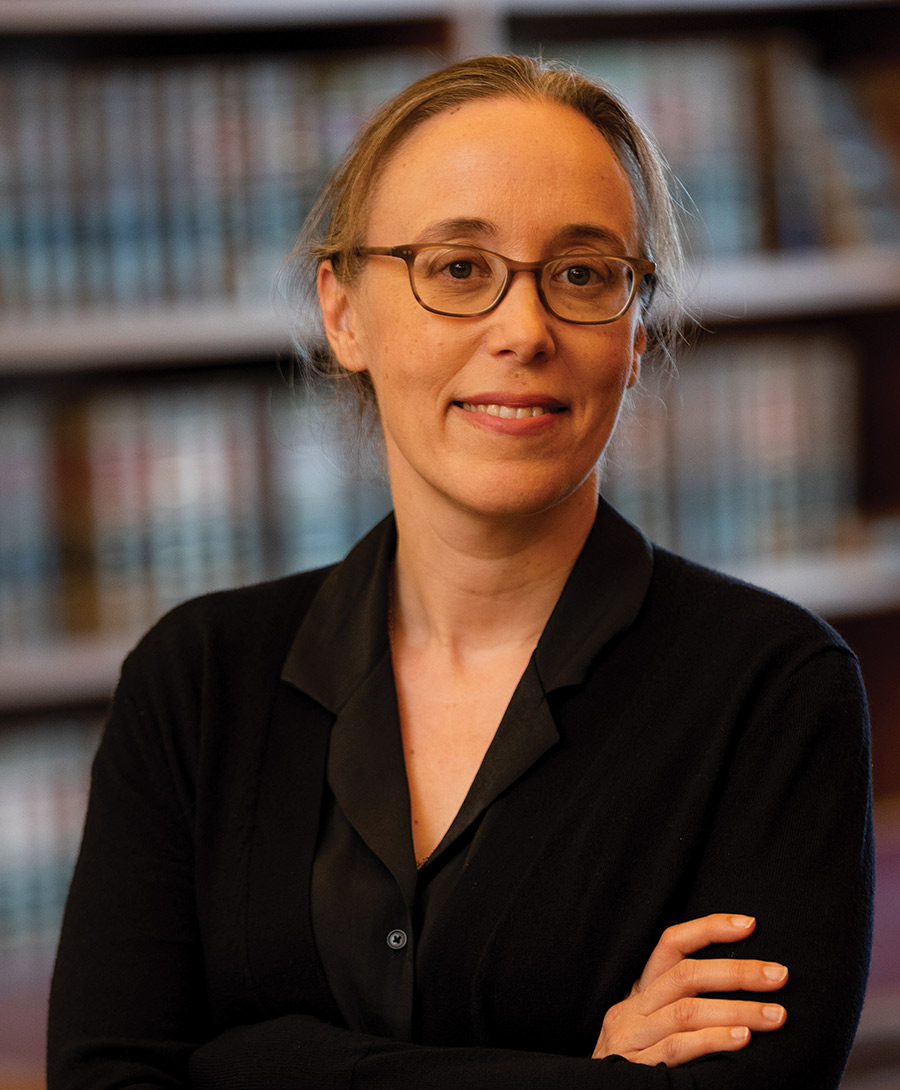
Jocelyn Simonson
In her new role, Simonson is charged with developing and promoting the Law School’s scholarly community, including the work of its outstanding faculty, which was ranked 33rd nationwide in a recent study of scholarly impact. She will help develop student scholarship, including work on Brooklyn Law School’s four law journals, and will coordinate with the Law School’s nationally known centers and institutes.
Simonson’s own scholarship, which has been cited twice by the U.S. Supreme Court, explores ways in which the public participates in the criminal process and in the institutions of local governance that control policing and punishment. She is currently working on a book, Radical Acts of Justice: Shifting Power to the People, from Community Bail Funds to Courtwatching (The New Press), forthcoming in 2023.
Shining a Spotlight on Prosecutorial Misconduct
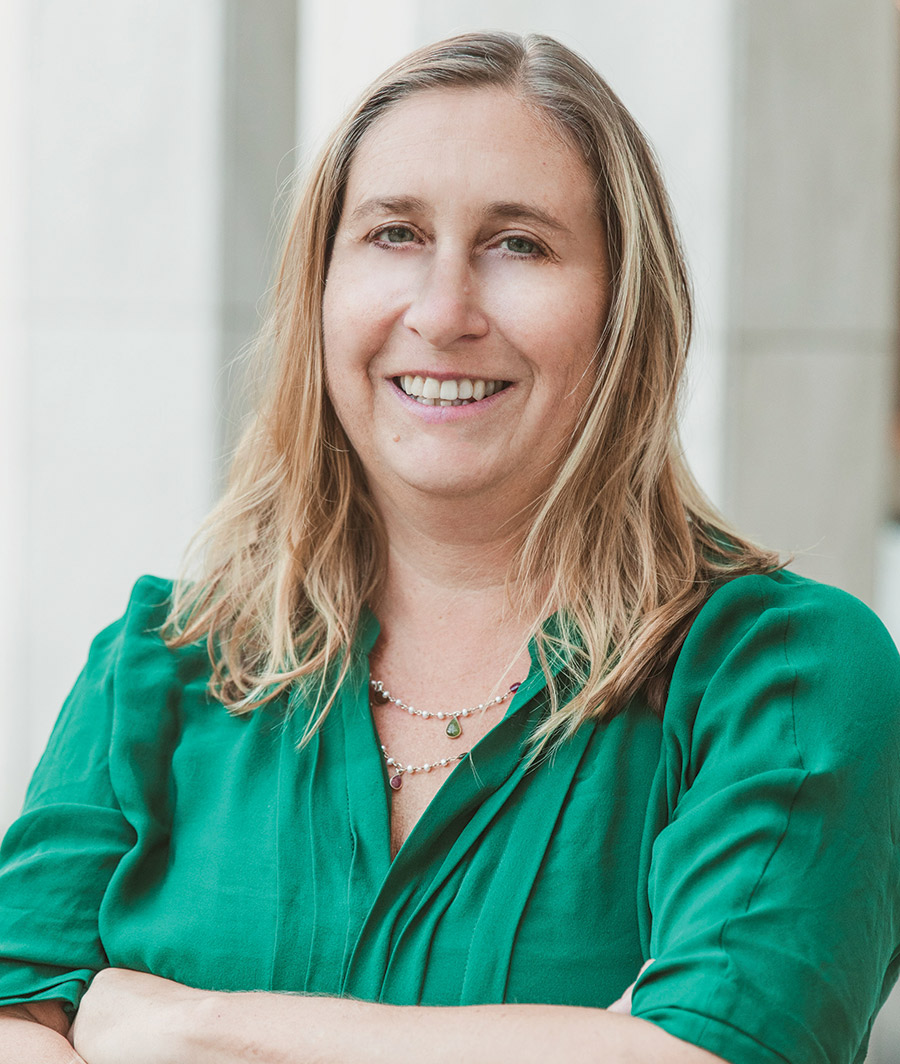
But when prosecutorial misconduct is behind the convictions, these cases are also disturbing from a professional ethics perspective. Bringing such misconduct to light is the mission of Accountability NY, a project led by a group of six law professors, including Brooklyn Law School Professor Cynthia Godsoe.
The group has filed ethics complaints concerning almost 40 prosecutors whom appellate courts had found committed misconduct. Although the first complaints were filed with the bar’s Grievance Committee in charge of attorney discipline 18 months ago, no action against the prosecutors has been publicly acknowledged. The cases include a Brooklyn prosecutor who withheld key evidence at trial that could have exonerated the accused, a man who spent 24 years in prison, and a Queens case in which three men spent over two decades in prison after what a judge called false statements to the court at trial and withholding evidence.
Prosecutorial misconduct should be investigated and addressed by each judicial district’s Grievance Committee, and could result in public admonition, suspension, or disbarment for the prosecutors. Yet the fate of the complaints filed with those committees is unclear, Godsoe said. The city’s lawyers fought against Accountability NY’s efforts to publish the complaints, but in July, the U.S. District Court of the Southern District of New York ruled in favor of Accountability NY, based on First Amendment rights.
“Our project illustrates how reluctant the bar seems to police its own,” Godsoe said.
The issue is widespread. A recent National Registry of Exonerations study found that prosecutorial misconduct was at play in one-third of 2,400 exonerations. The Death Penalty Information Center found more than 550 U.S. cases that led to capital convictions being overturned.
“Prosecutors don’t have clients, and they’re supposed to act in the interest of justice,” Godsoe said. Instead, “the primary way [District Attorneys’ offices] measure success is conviction rates, so the incentive is there to win at any cost. But you’re cheating people out of their lives.”
She sees signs of hope, including progressive prosecutors willing to address misconduct, such as Eric Gonzalez in Brooklyn and Alvin Bragg in Manhattan, not to mention her students.
“They have no patience for this,” Godsoe said. “They only want to work at the [D.A.] offices where this doesn’t go on.”
Watch video of Godsoe and two panelists discussing wrongful convictions and prosecutorial misconduct.
No Sleep for Clinic Aiding Domestic Violence Survivors
Instead, she and her colleagues and students worked to expand the clinic’s Survivors Justice Project (SJP), an interdisciplinary collective launched in 2020 with a mission to help incarcerated people seek reduced sentences under the state’s 2019 Domestic Violence Survivors Justice Act (DVSJA), which allows courts to consider whether sexual, psychological, or physical abuse contributed to convictions. SJP is led by a team of formerly incarcerated women, all survivors of long-term incarceration and most domestic violence survivors. The clinic has worked with eight survivors released from prison, including three who received indeterminate sentences as teenagers. The goal is to have New York serve as a model for other jurisdictions.
“We’re trying to build best practices in the implementation of DVSJA, and the clinic is at the center of that,” said Mogulescu. To help corral statewide data that looks at the role of geography, race, and other factors, she has secured a generous $200,000 commitment over two years from four law firms: Cravath, Swaine & Moore; Davis Polk; Weil, Gotshal & Manges; and Paul, Weiss, Rifkind, Wharton & Garrison. Those funds allowed SJP to bring aboard new legal fellow Clarissa Gonzalez, who will lead SJP efforts to be a DVSJA clearinghouse for data collection and fielding inquiries from survivors in jail and prison.
What’s Next After Dobbs?
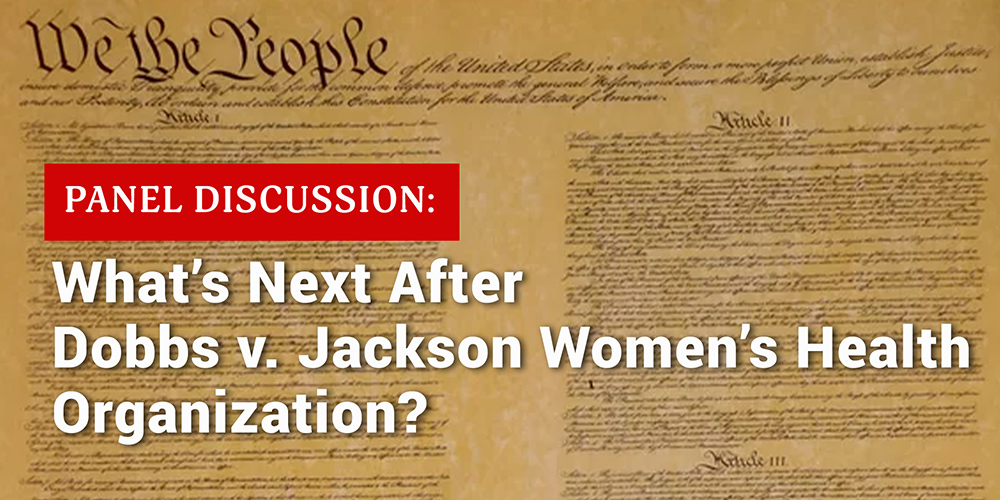
But, at a Brooklyn Law School virtual event on Sept. 19, professors and thought-leader guests discussed potential legal paths to address a decision that all agreed was devastating to women’s rights. Associate Dean Karen Porter moderated the event, which was co-sponsored by the Center for Health, Science, and Public Policy and the Women’s Leadership Network.
Professor Susan Herman, president emeritus of the American Civil Liberties Union, said post-Dobbs battles will be fought on various fronts across a nation now divided into states where abortion remains legal and those where abortion restrictions snapped into place.
Hugh Ryan Book Explores Intersection of NYC’s Queer and Carceral Histories
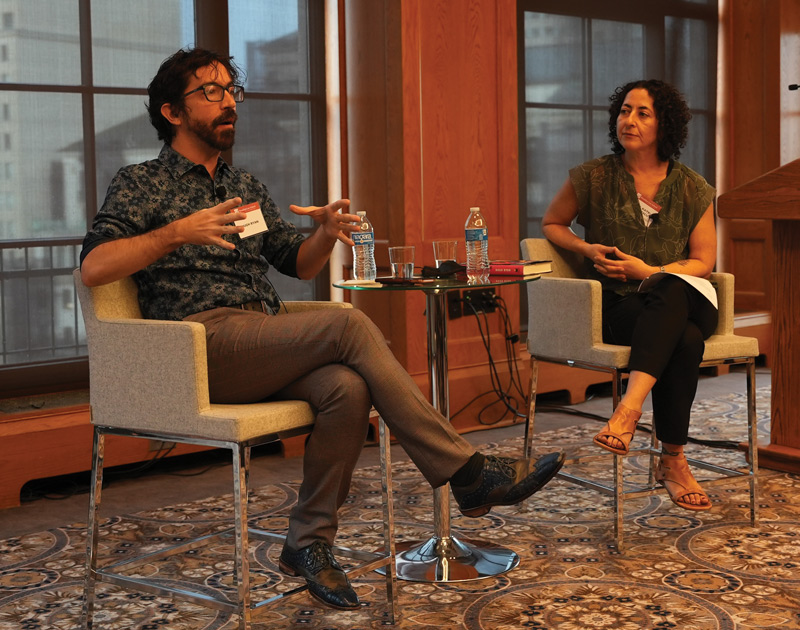
Professor Kate Mogulescu, right, interviews author Hugh Ryan about his latest book as part of our Book Talk series.

Author Hugh Ryan shared insights from his latest book, The Women’s House of Detention: A Queer History of a Forgotten Prison, which delves into LGBTQ history and the dramatic story of a now-shuttered women’s prison in New York City, as part of Brooklyn Law School’s Book Talk series.
“When I started researching queer history, the trail led me back to prisons, as places of confinement, community, and as vast unexplored archives of LGBTQ history,” said historian and curator Ryan, during a Sept. 19 book talk at the Subotnick Center. It was moderated by Professor Kate Mogulescu, with participation by Professors Alexis Hoag-Fordjour and Jocelyn Simonson, the three co-directors of the Center for Criminal Justice, which sponsored the event.
Following that trail, in the wake of his award-winning first book When Brooklyn Was Queer, led Ryan to one infamous prison in New York’s Greenwich Village. From 1929 to 1974, the so-called “House of D” was filled with stories of the thousands of incarcerated women and gender-nonconforming people subjected to neglect and brutal treatment.
Faculty Notes
PROFESSOR STEVEN DEAN joined a panel of tax experts for a “Strengthening the IRS to Create a More Equitable Tax Code” webinar hosted by Prosperity Now on June 15. Experts at the webinar outlined how proper funding and a better-funded tax code can benefit the lowest-income families, especially families of color.
PROFESSOR HEIDI K. BROWN, author of the new book The Flourishing Lawyer, moderated a panel titled “Coaching Law Students for Healthy Performance” on July 5 at the Congress for the International Academy for Law and Mental Health in Lyon, France.
PROFESSOR FRANK PASQUALE discussed the challenges and advantages of artificial intelligence and how it is changing medical practice during a virtual Sydney Ideas, held July 25 by the University of Sydney.
New York Bar Associations—with pro bono support from PROFESSOR CYNTHIA GODSOE—counted a victory July 25 when a New York state judge ordered the state and New York City to pay assigned counsel for children and indigent adults at the same pay rate received by assigned counsel in federal court. It marks the first rate increase in 20 years.
ADJUNCT PROFESSOR CYRUS D. MEHTA, a renowned immigration law scholar, was named the new editor-in-chief for the American Immigration Lawyers Association Law Journal in July.
It All Added Up
Sonya Smith-Valentine ’97
“Especially in litigation work, I would ask myself, ‘How did we get here?’” Smith-Valentine said. “There was a failure in decision somewhere, because this should never have happened; the client should not be in court. And then after you conduct the discovery and dig in, you realize this was a leadership failure.”
Such behind-the-scenes dysfunction inspired Smith-Valentine to start Financially Fierce, a training and consulting business that she runs from her home just outside Washington, D.C. With the direct style of a native New Yorker—and decades of financial and legal experience behind her—Smith-Valentine helps corporations improve their bottom line by training managers to make financially astute decisions, and she helps set things straight when they do not.
Legend Maker
Allen Grubman ’67
For decades, Grubman has been one of the most revered names in entertainment law, with a blue-chip client list that includes Lady Gaga, Madonna, Bruce Springsteen, Martha Stewart, Robert DeNiro, and LeBron James.
But the story of how Grubman co-founded the Hall of Fame, where he remains the secretary and treasurer, is less well known. It all started in 1983, when Atlantic Records co-founder Ahmet Ertegun invited him to lunch at Pearls Chinese Restaurant, revealing only that “it’s important for you to be there because of the fact that you’re a lawyer,” recalled Grubman, senior partner at Grubman Shire Meiselas & Sacks.
The
Rise
of
Green
Cities
For legal professionals in finance, land use, and real estate, the move toward a greener future brings endless opportunities.
Illustration by Celyn Brazier

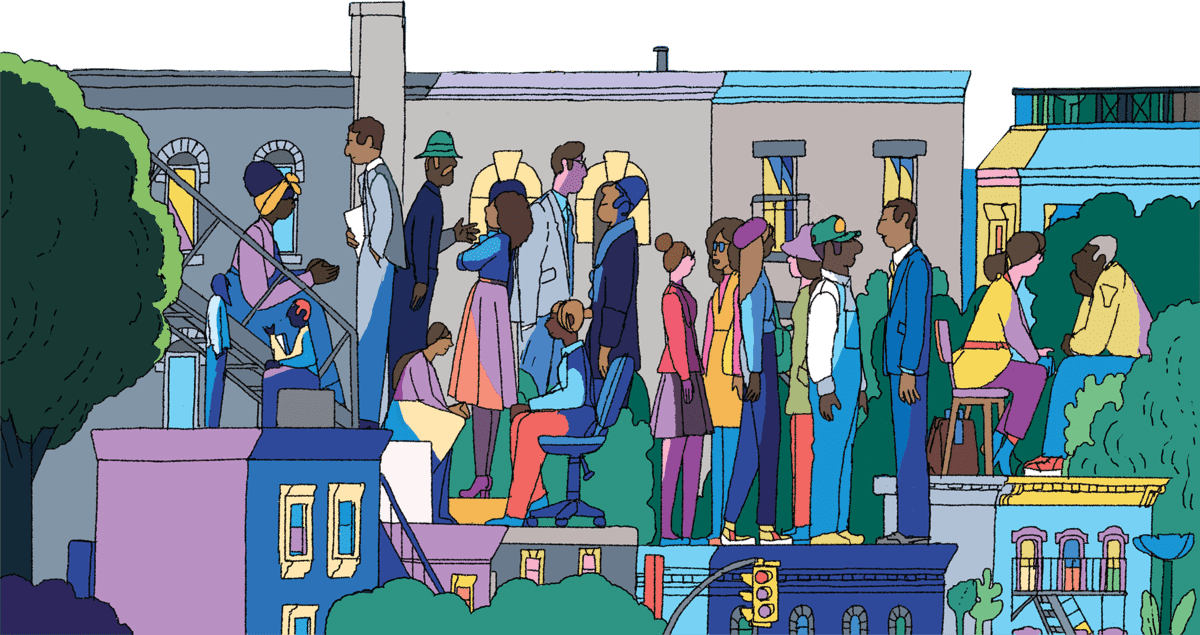
These scenarios have progressed from the realm of the imagination to reality, especially as cities worldwide race to prioritize sustainable structures that mitigate the impacts of global warming and create healthier work and home environments. Meanwhile, myriad players, including attorneys, are finding solutions that put a sustainable and healthier future increasingly within reach.
Brooklyn Law School has been prescient about sustainability; classes on the topic are now in their 14th year. Over the summer, the Introduction to Sustainability & Future Cities Boot Camp united professionals, alumni, and students to share ideas, knowledge, and experiences. Discussions at the event, as well as interviews with faculty and alumni afterward, revealed that the rise of green cities—and towns—is happening now.
Summer of Service

These five third-year law students were drawn to public service work for different reasons, but they are part of the same compassionate guild. They want to help empower and alter the fates of people in need through a deeper understanding of their stories, focusing on immigrants, juveniles, and low-income detainees.
They share an affinity for helping those who are disenfranchised, a knack for storytelling, and an awareness that with every court filing, brief, or appearance, they are getting closer to becoming the kind of attorneys and—perhaps more importantly—the kind of people they want to be.
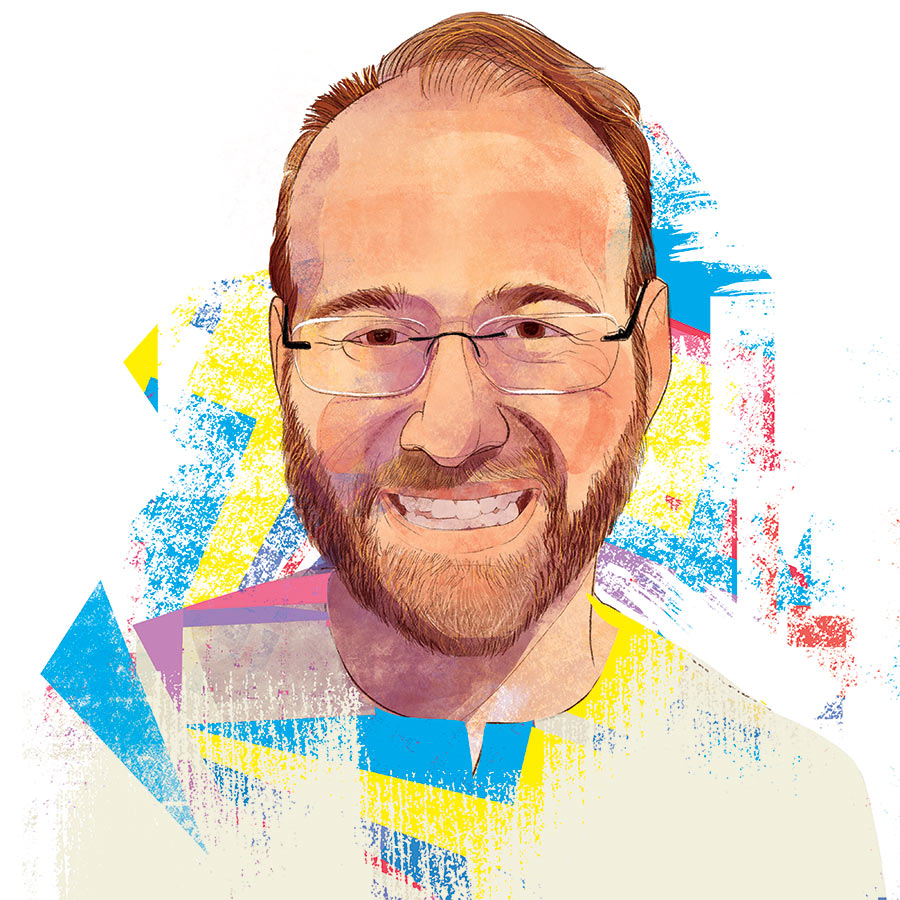
THE EDUCATOR

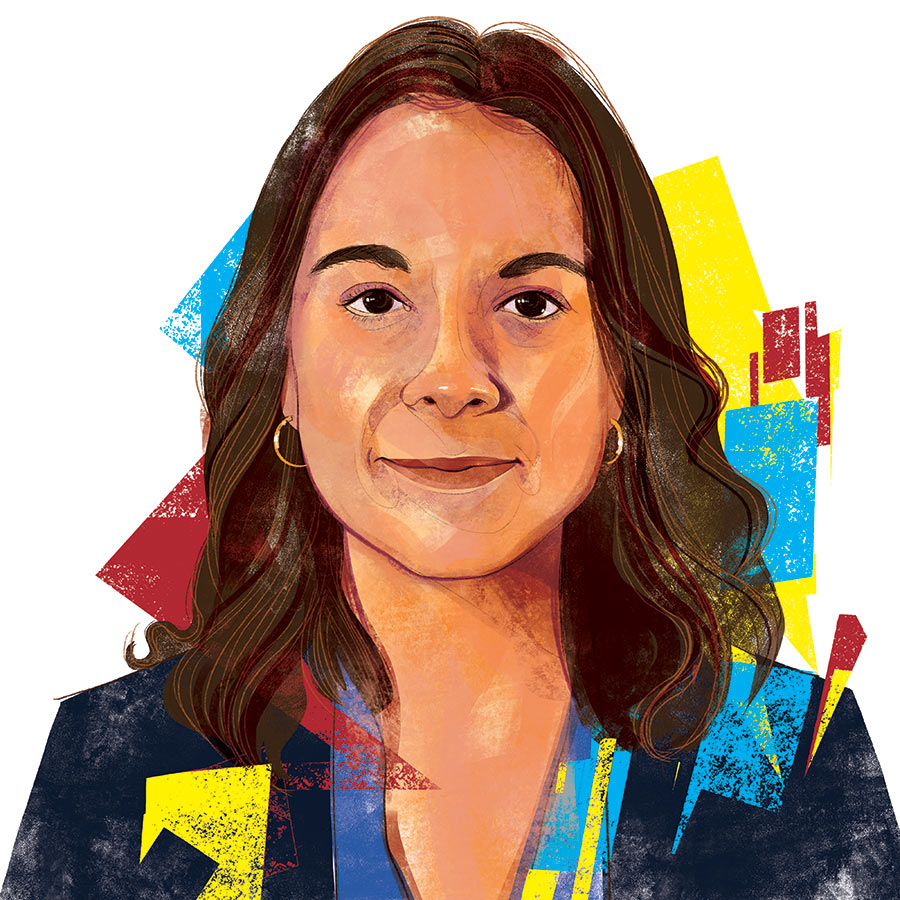
THE ADVOCATE

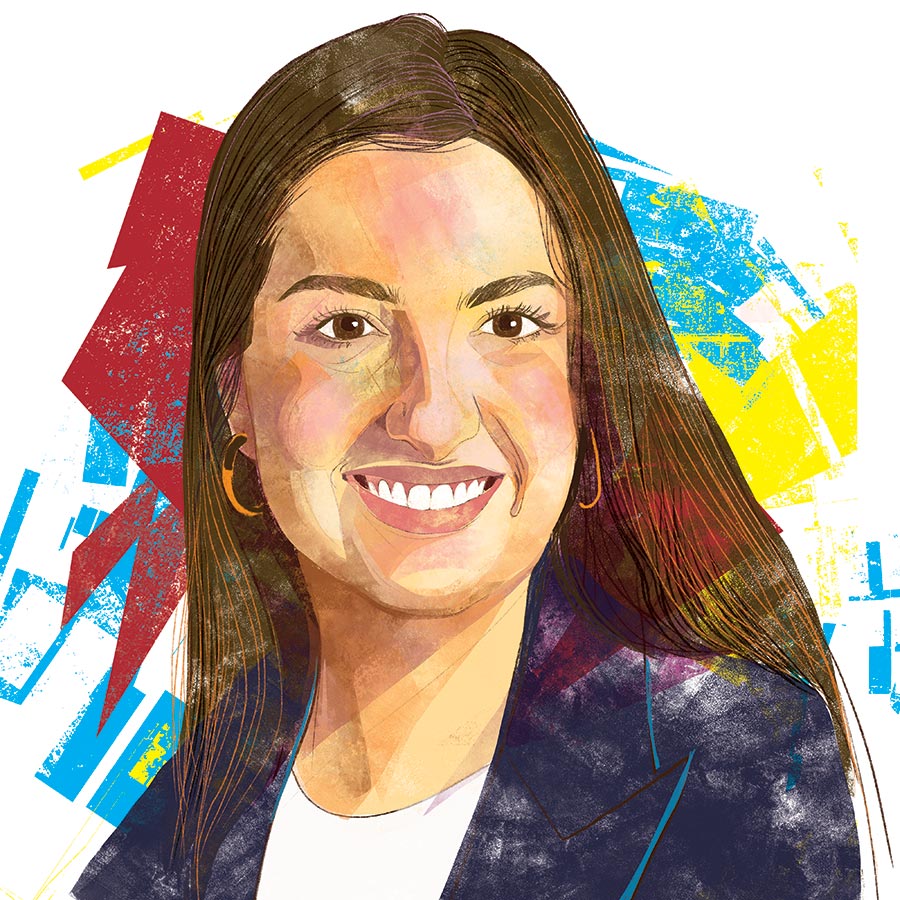
THE HOLISTIC PRACTITIONER

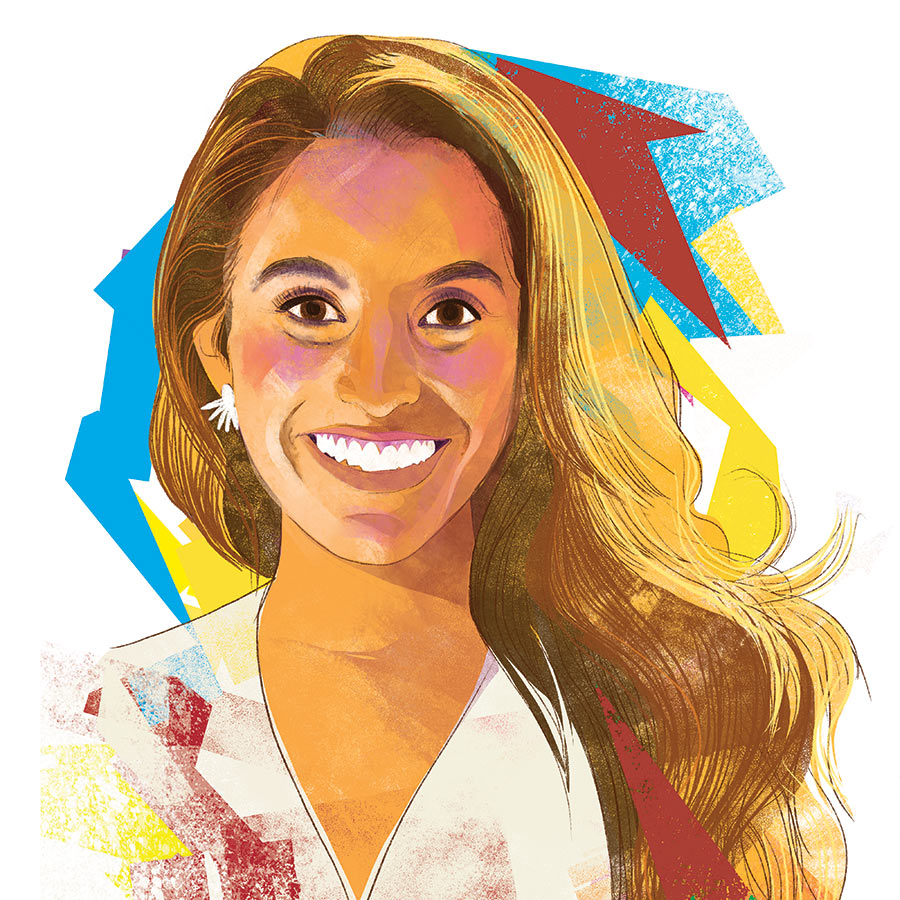
THE STORYTELLER

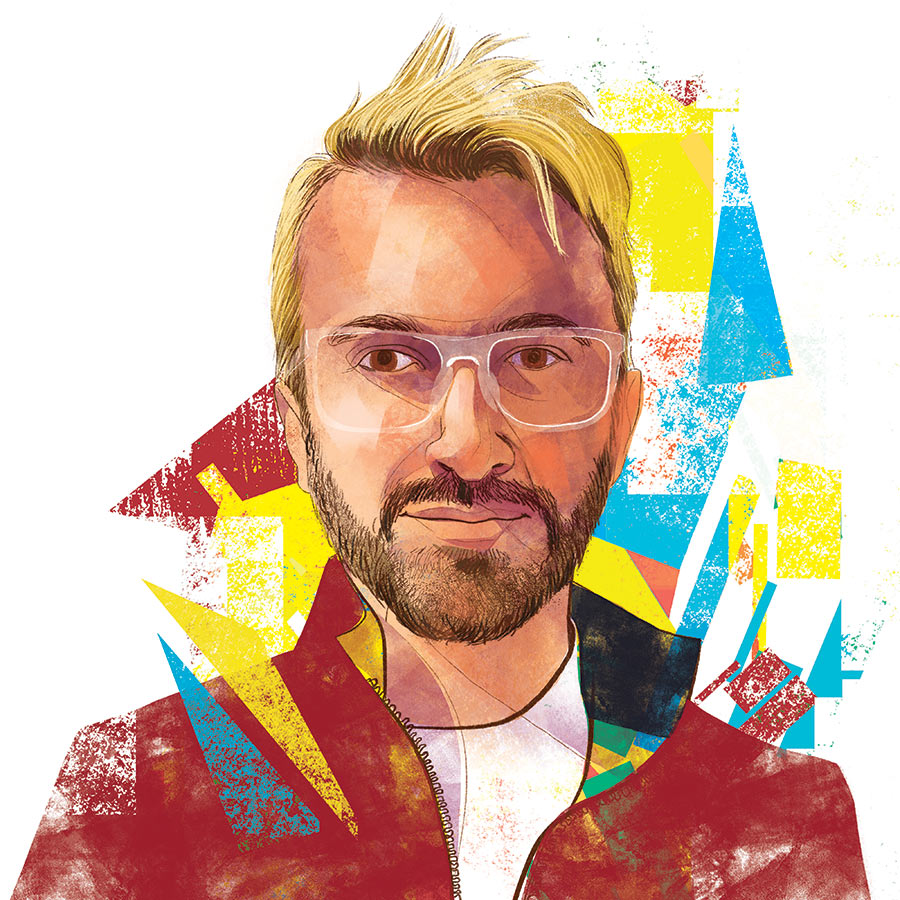
THE PIONEER


THE EDUCATOR


THE ADVOCATE


THE HOLISTIC PRACTITIONER


THE STORYTELLER


THE PIONEER

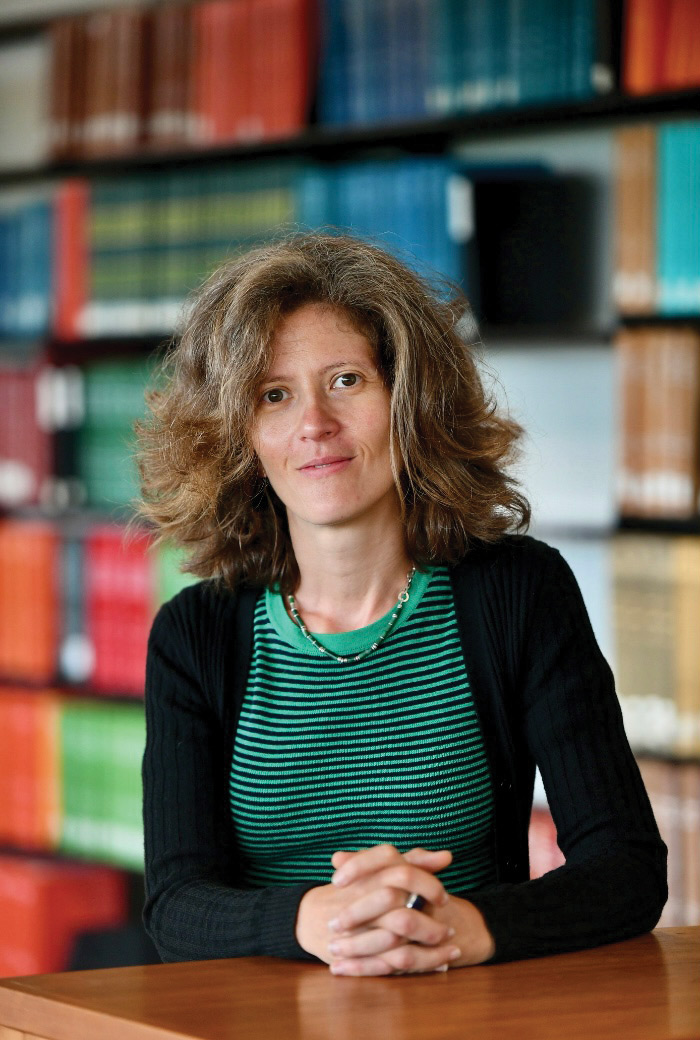
New Professors to Challenge Students With Intriguing Legal Issues, New Ideas
Anna Roberts, formerly a visiting professor at Brooklyn Law School, has joined the tenured faculty as Professor of Law, and is teaching Evidence, Criminal Law and Procedure (including contemporary issues), and Torts.
“Among the many reasons why I was thrilled to accept the offer were the students and the faculty,” Roberts said. “Visiting allowed me to meet a large group of students in my Evidence class, and the discussions that we had in that course were among the best that I have had in my teaching career. The faculty is mighty across the board and, in the areas on which I focus, includes scholars that have influenced me as much as anyone in the field.”
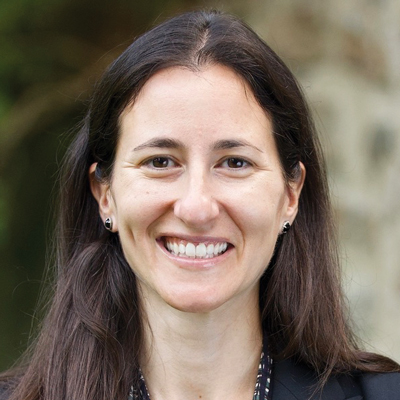
Brooklyn favorites: “I love just walking around the different streets and neighborhoods in Brooklyn. Before I moved out to the suburbs, I clerked in the Eastern District of New York—you can see the courthouse from the windows in one of my classrooms—and lived in Cobble Hill.”
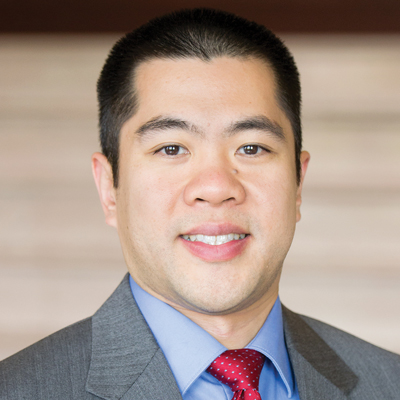
Brooklyn favorites: “I enjoy taking a Citi Bike through Prospect Park. Living in Brooklyn also provides access to a wide variety of cuisines. Finally, I enjoy being closer to my parents: My dad lives in Queens and my mom lives on Long Island.”
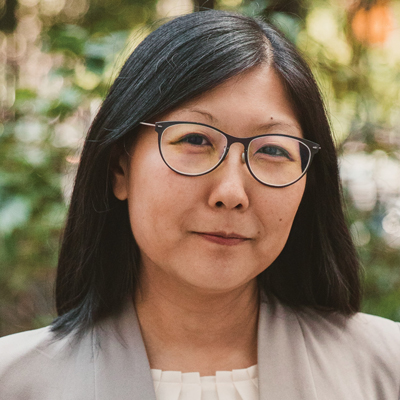
Brooklyn favorites: “I love that Brooklyn brims with creativity, possibility, and courage, even during the toughest of times. Because we love beaches, my family is looking forward to taking the Brooklyn ferry to the Rockaways on the weekends. We’ve already begun to find Brooklyn analogues to our favorites, such as enjoying arepas in Bar Caracas’ outdoor patio, and the Thai curries at Lemongrass.”
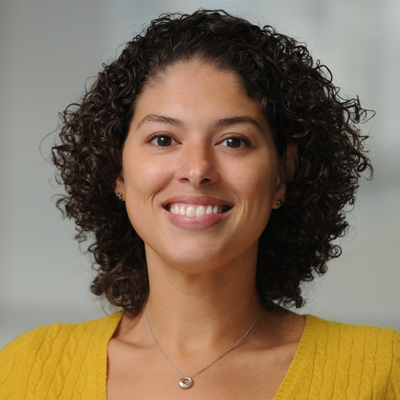
Brooklyn favorites: “I love shopping at Sahadi’s on Atlantic Avenue. The chocolate malt balls are my favorite.”
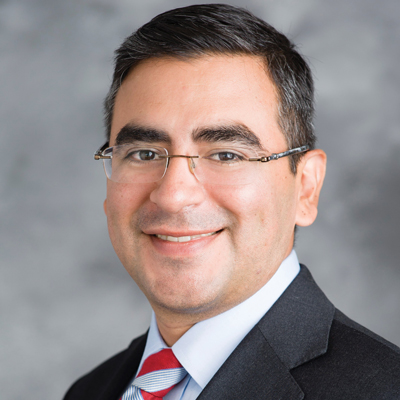
Brooklyn favorites: “I love how Brooklyn is so diverse and filled with interesting people from all walks of life.”
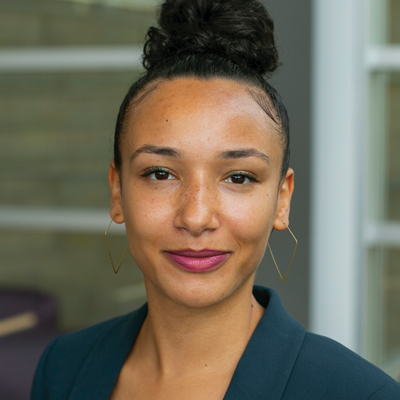
Brooklyn favorites: “I’m very excited about going to Barclays Center this upcoming basketball season. The Lakers will be here in January—can’t wait.”
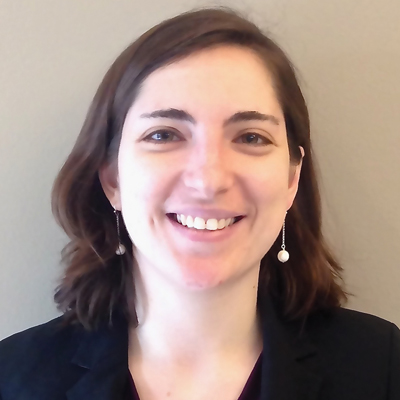
Brooklyn favorites: “This is my first time living in Brooklyn, so I’m still discovering new places. My favorite spot, so far, is Prospect Park on a sunny day.”
Students Are All Ears in Professor Alexis Hoag-Fordjour’s Classes
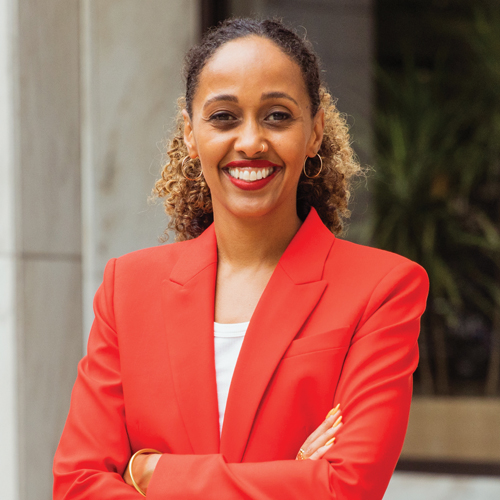
Hoag-Fordjour uses contemporary music as a learning tool. On the first day of Evidence, she assigned students to either the defense or the prosecution to argue whether a judge should admit rap lyrics as evidence in a criminal trial. In practice, prosecutors have used such evidence against defendants facing criminal charges, especially young Black men. “The exercise allows for a fruitful discussion about prejudice versus probative value, and about how race can factor into evidentiary determinations,” Hoag-Fordjour explained.
When courses went temporarily remote in January 2022, Hoag-Fordjour continued the tradition as a pre-class icebreaker for her Criminal Procedure students logging onto Zoom. Once in-person classes resumed, students began submitting recommendations of songs with lyrics referencing the criminal adjudication system. She happily obliged. “I’m responding to the students,” said Hoag-Fordjour, also a co-director of the Center for Criminal Justice. “They’re dialed in; they’re committed to learning good practice skills and I want to be responsive to that. My teaching style is also informed by what I would have wanted as a student.”
To learn more, visit www.brooklaw.edu/facultyscholarship →
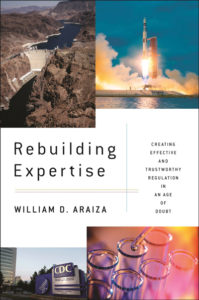
Rebuilding Expertise: Creating Effective and Trustworthy Regulation in an Age of Doubt (NYU Press, 2022)
Americans’ trust in public institutions is at near historic lows and “bureaucracy” and “big government” are pejorative terms. Araiza investigates the sources of this phenomenon and explains how we might rebuild trust in our public institutions. Using an interdisciplinary approach, with insights from history, political science, law, and public administration, Araiza explores our current bureaucratic malaise and presents a road map to finding our way out of it, toward a regime marked by effective, expert regulation that remains democratically accountable and politically legitimate (see Professor Araiza discussing his book at the Brooklyn Book festival).
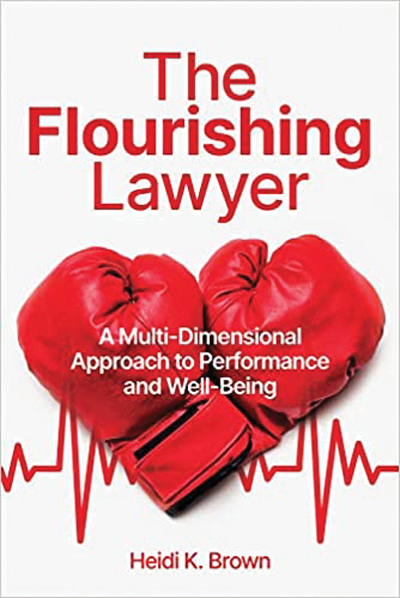
The Flourishing Lawyer (ABA Book Publishing, 2022)
The Flourishing Lawyer offers an empathetic guide for members of the legal profession to cultivate their personal and professional well-being, identify and develop their individual strengths, and define success on their own terms. Drawing from lessons and research from the fields of psychology, health care, sports, and medicine, this book is an affirming guide to becoming a better contributor to the profession while living a flourishing life (see “Flourishing” in the Field of Law”).
Alumni Toast Award Winners and Mingle at Alumni Luncheon
Attendees saluted the great accomplishments of Alumni Rising Stars Dong Joo Lee ’13, Mary Willis White ’13, and Alumni of the Year Frank V. Carone ’94 and Wanda K. Denson-Low ’81.
The mood was buoyant, as Valerie Fitch ’88, who ended her latest term as Alumni Association president, remarked on how everyone looked better in person than on a Zoom screen. “These events show what an amazing place Brooklyn Law School is and how incredible our graduates and faculty are. I’ve been proud to be president and enjoyed every minute,” said Fitch.
She also introduced incoming president Deborah Riegel ’93. “I want to thank Valerie,” said Riegel, “for stewarding the Alumni Association with grace, with an iron fist when necessary, with compassion, and a welcoming and collaborative nature. I have extraordinarily big shoes to fill!”
The event took place thanks to 33 generous sponsors who made the 2022 Alumni Luncheon possible. All proceeds from the event support the Annual Fund for students at Brooklyn Law School.
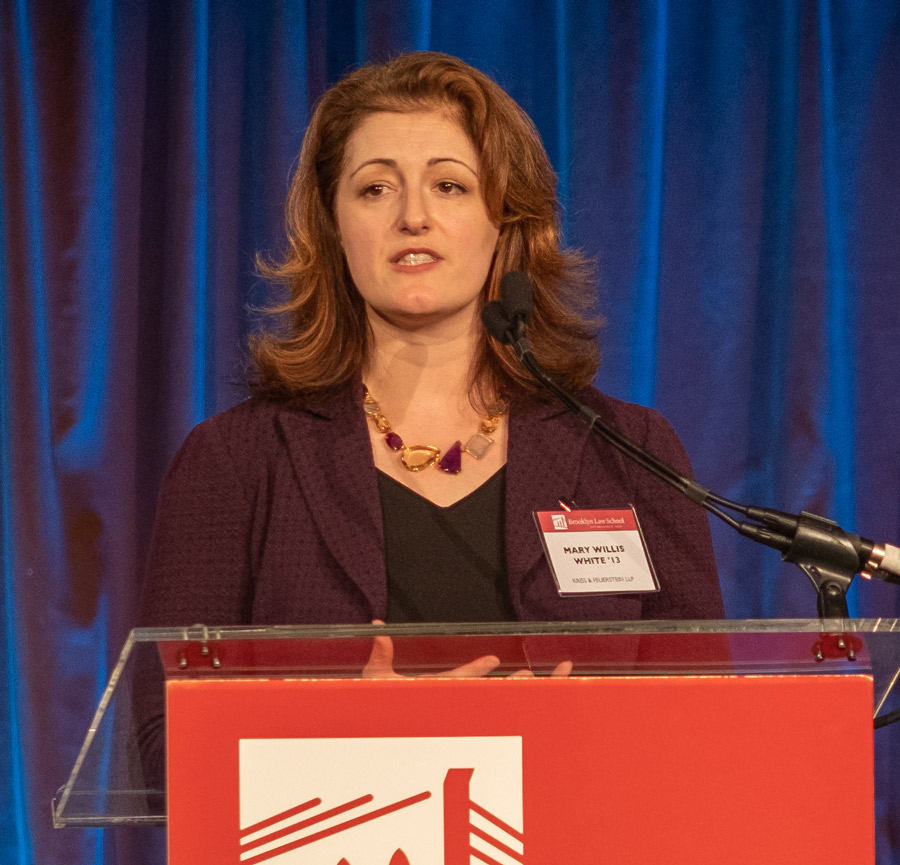
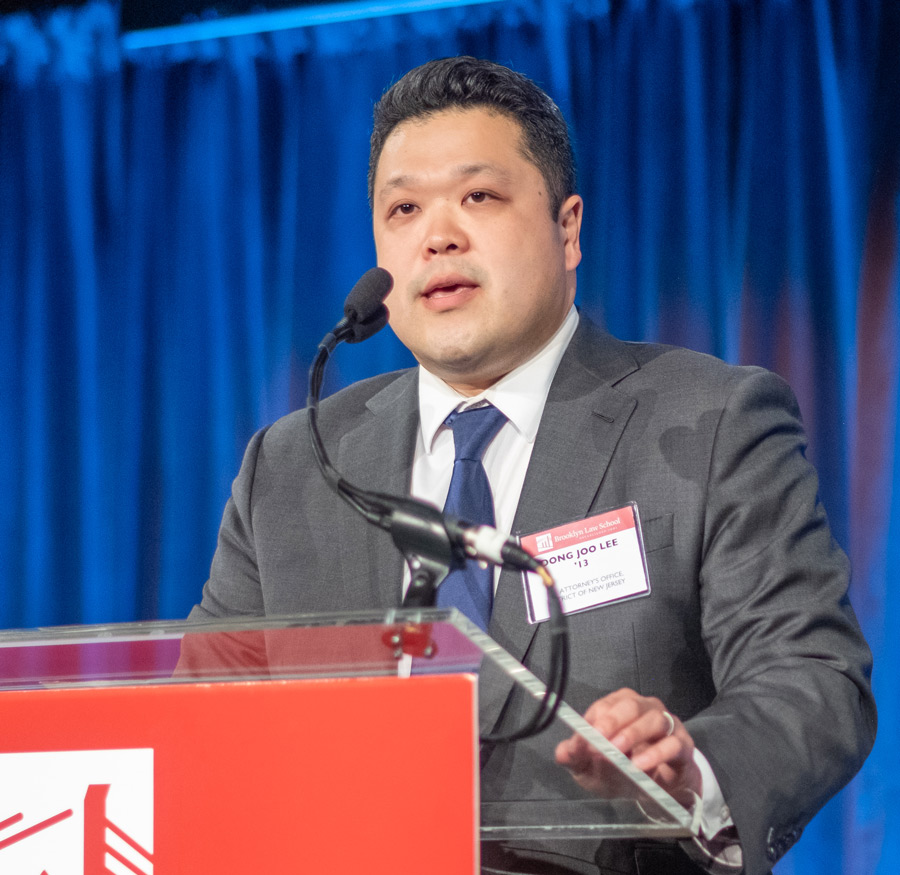
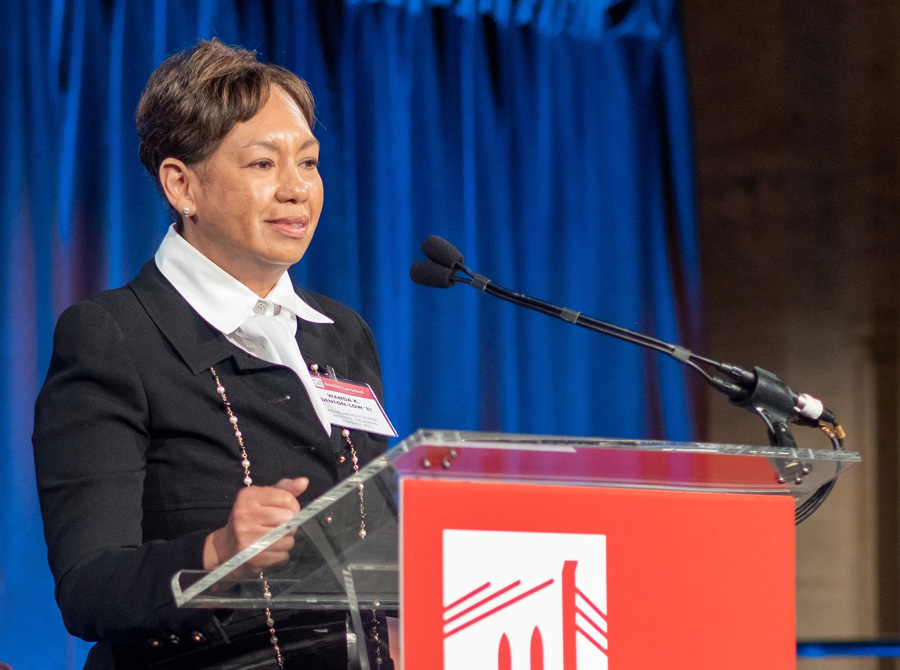
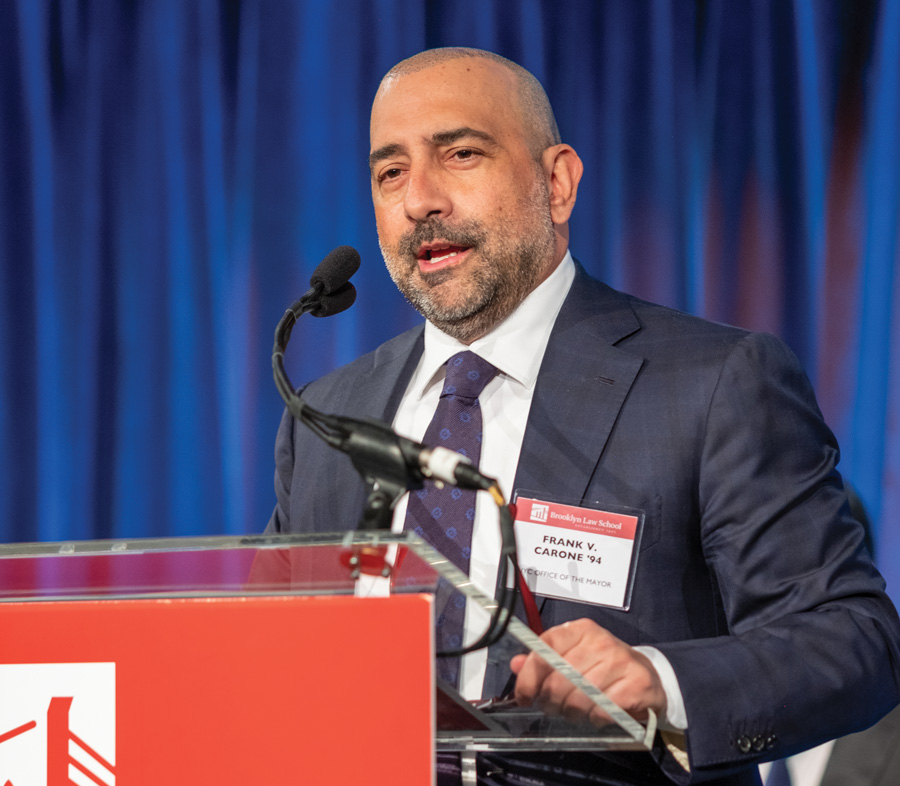
Reunions 2023 Will Be Held on Campus in the Spring
To get everyone in the spirit, we are sharing some throwback photos (below) from the 2018 reunion at New York City landmark Cipriani 25 Broadway, which was the last time these same groups reconnected with friends, classmates, and faculty. We look forward to celebrating with you.
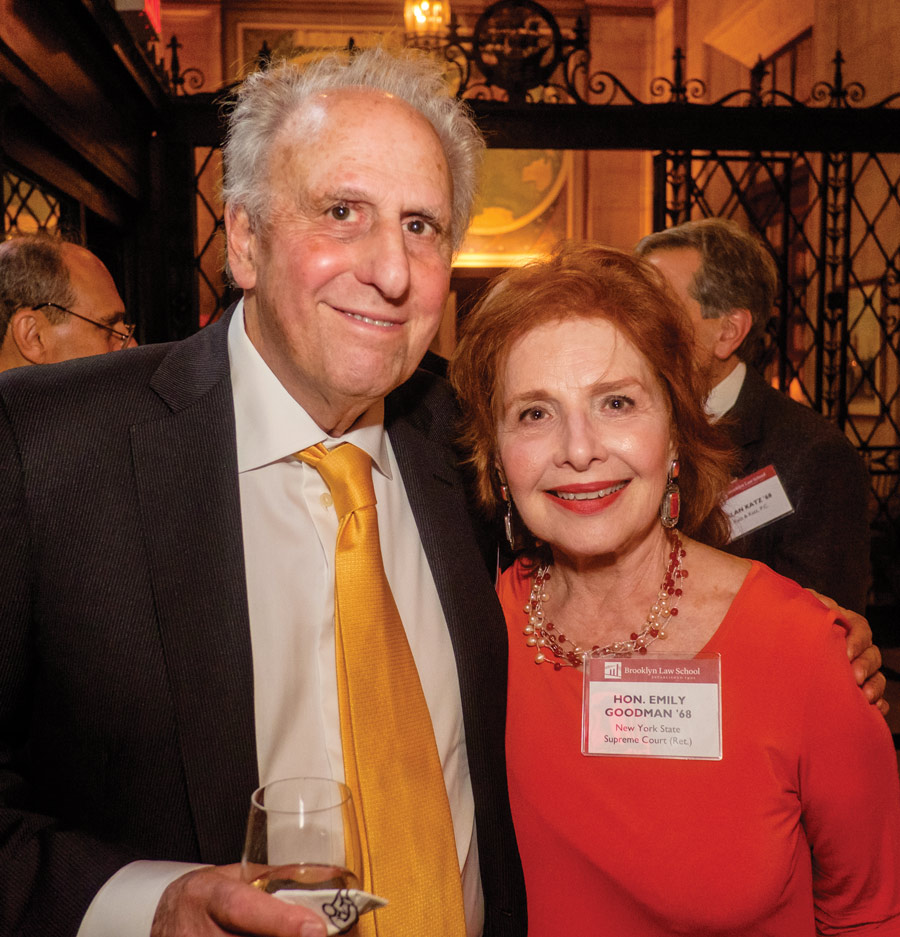
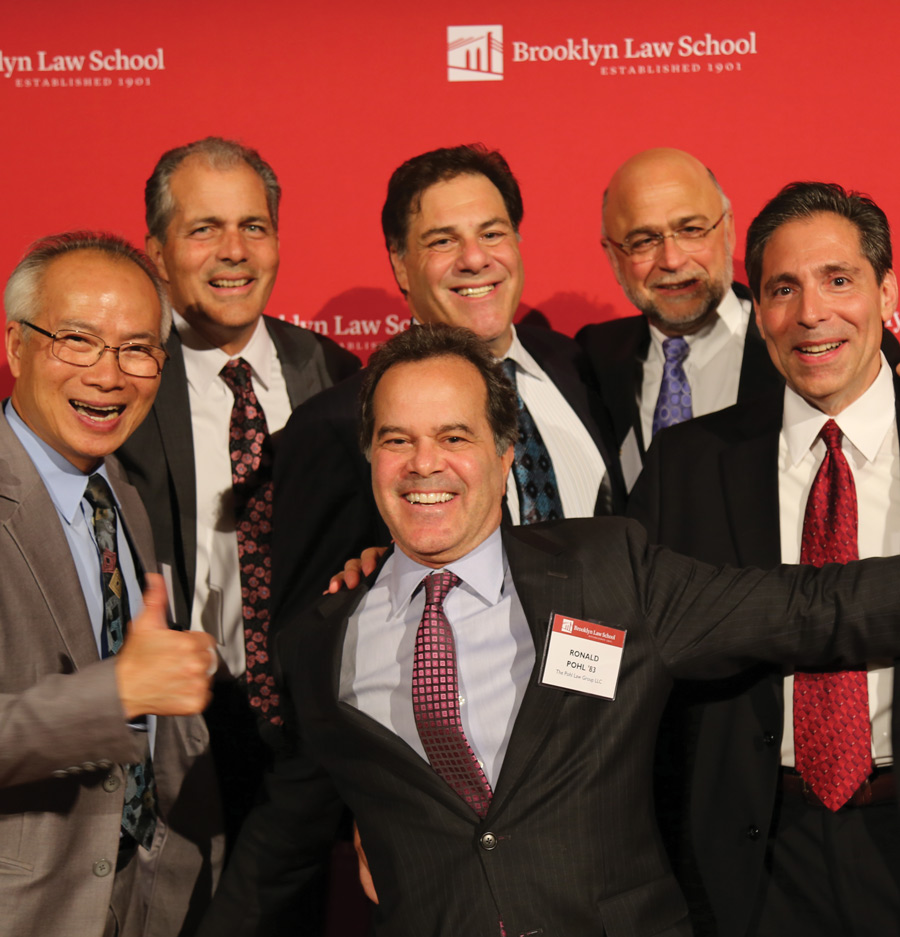
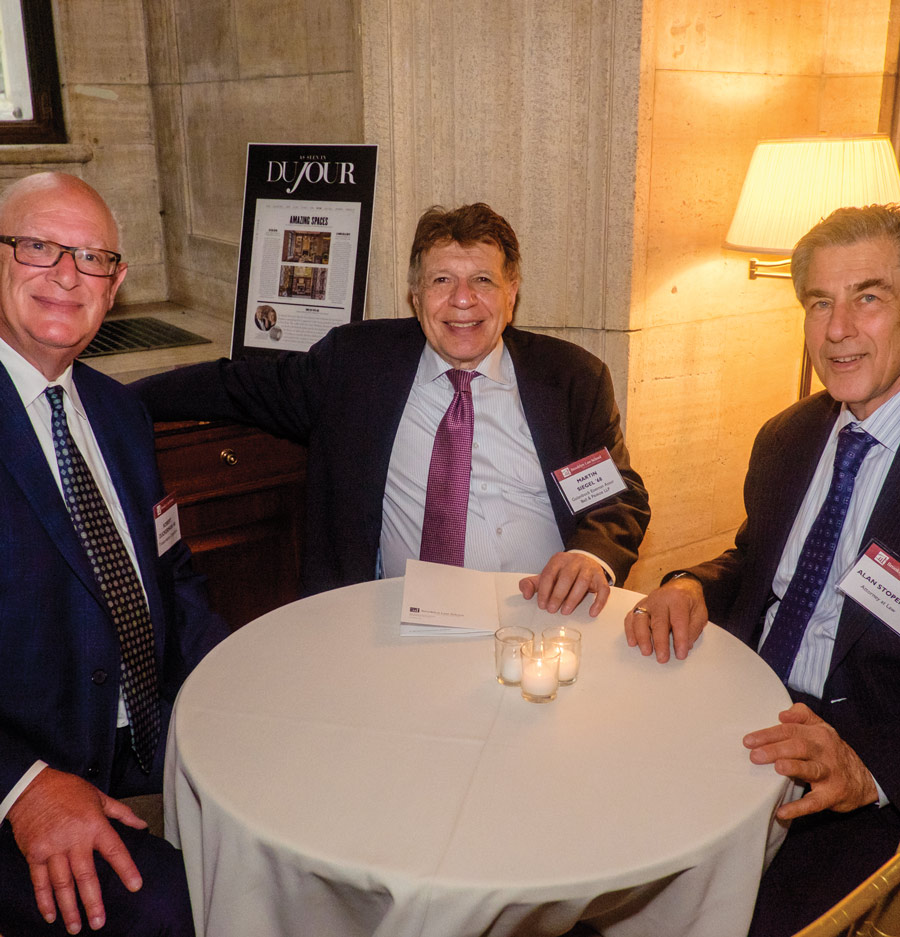
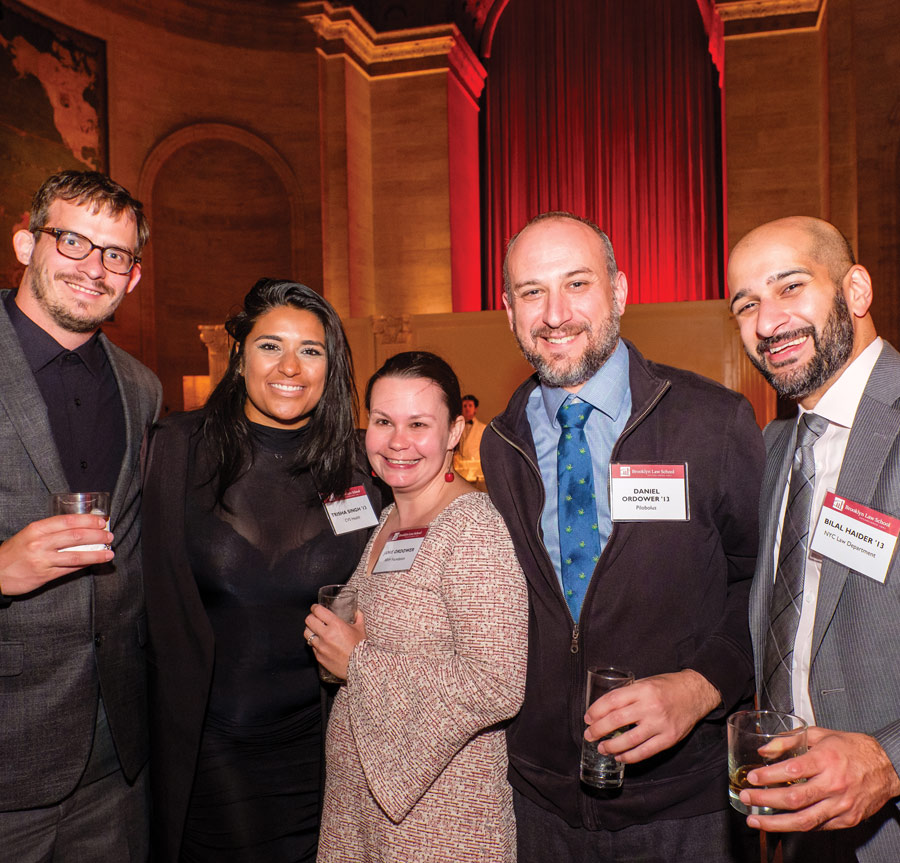
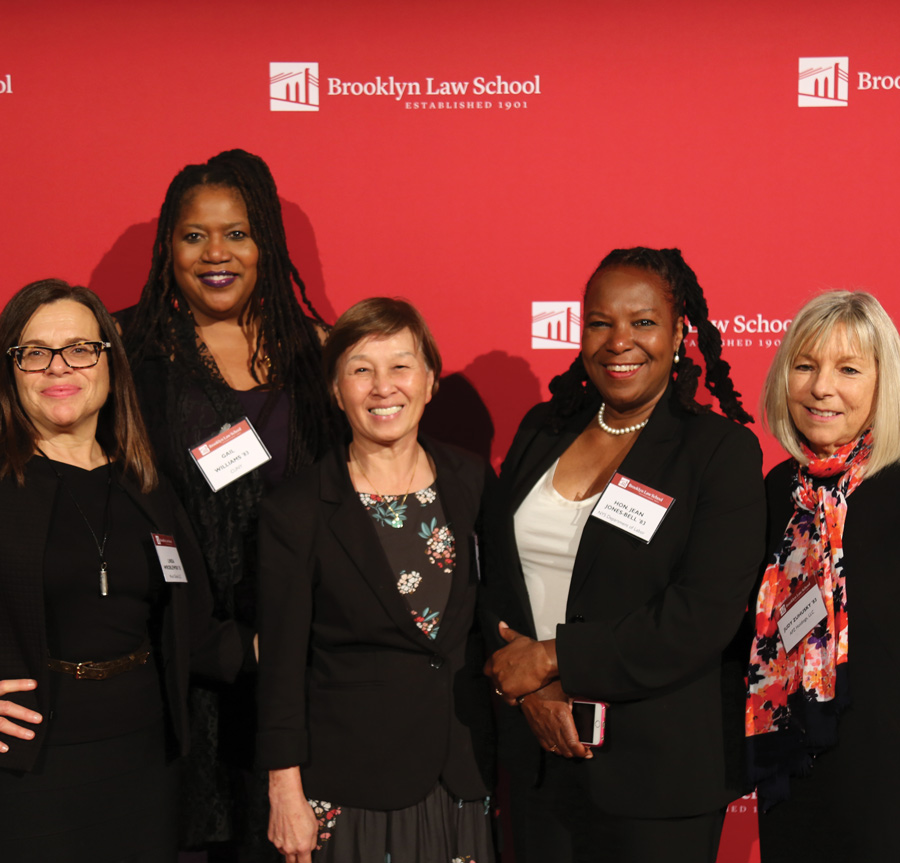
Taft Foundation Elevates Grant to $1.7M as Disability and Civil Rights Clinic Expands Reach
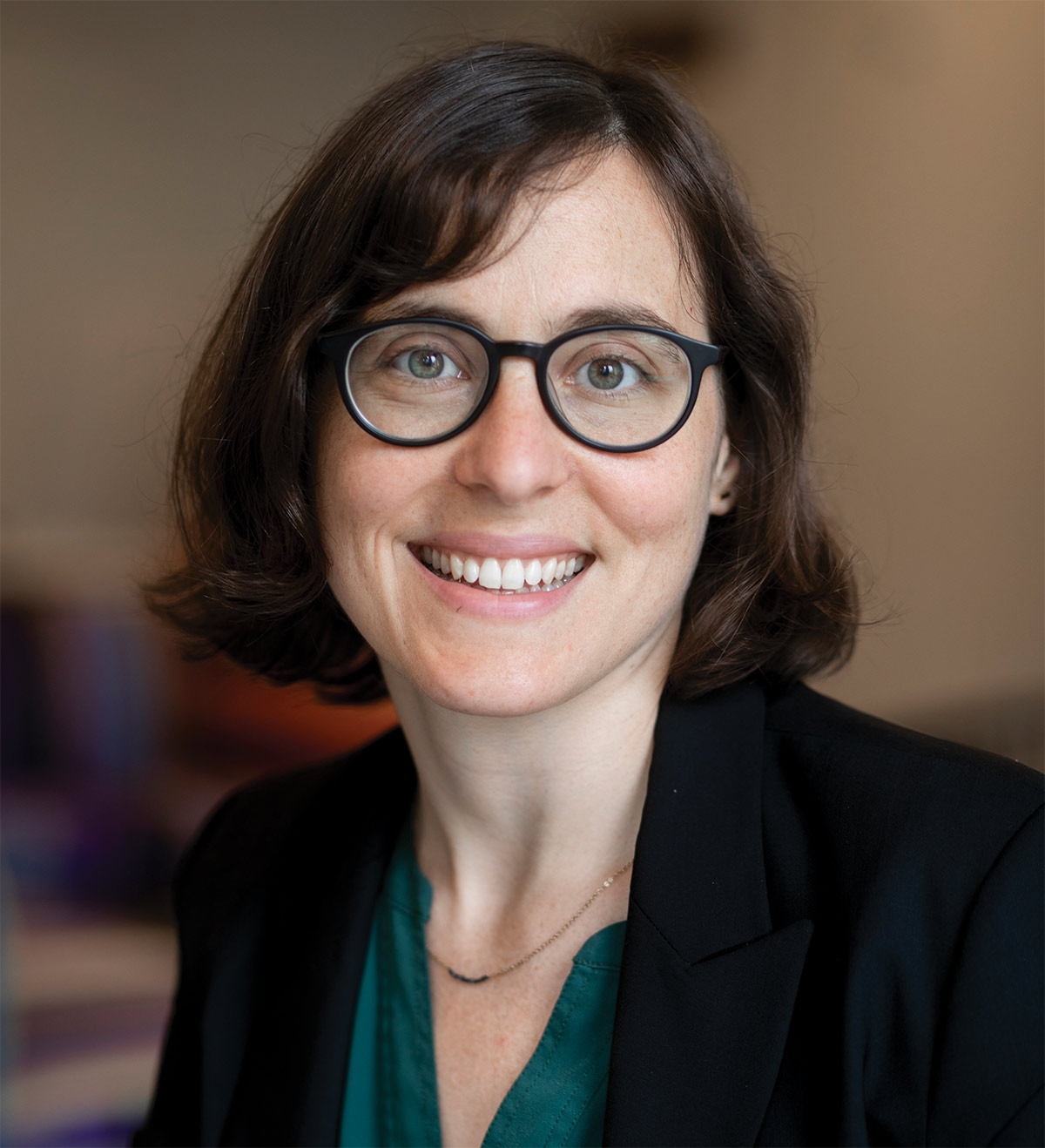
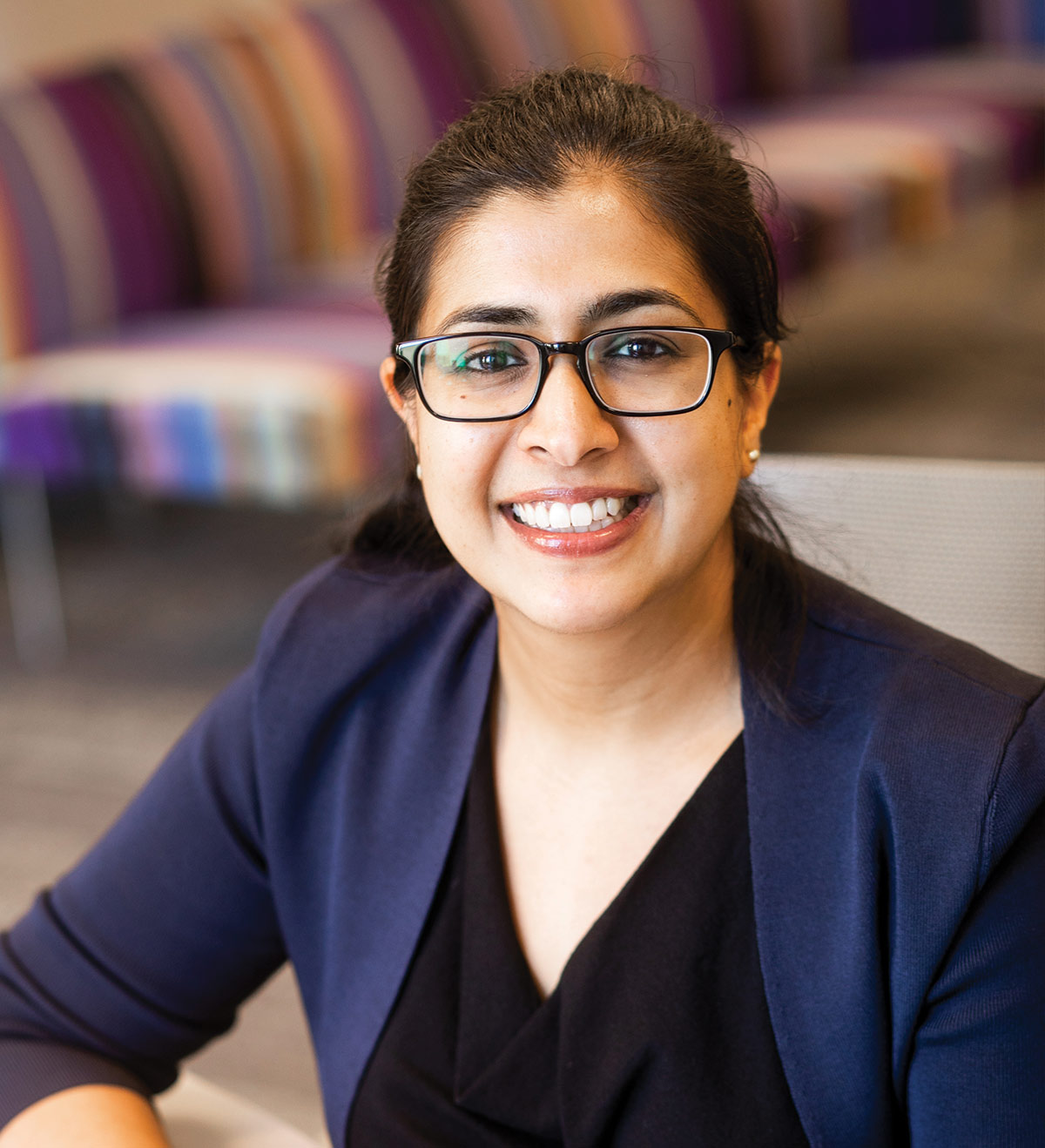
Led by co-directors Professors of Clinical Law Sarah Lorr and Prianka Nair, the clinic focuses its advocacy on clients who are placed under or are at risk of being placed under guardianship, parents who are enmeshed in the child welfare system, and incarcerated people.
The clinic’s efforts came to fruition over the summer. Lorr, along with Jane Dowling ’22 and Lydia Saltzbart ’22, helped research and draft the New York City Bar Association Mental Health Law Committee’s brief supporting a New York State bill to give adults with I/DD the right to legally enforceable “supported decision making” with the assistance of a chosen circle of support. Introduced by the Office of People with Developmental Disabilities, the bill passed the state Senate in April, and Gov. Kathy Hochul signed it into law July 26.
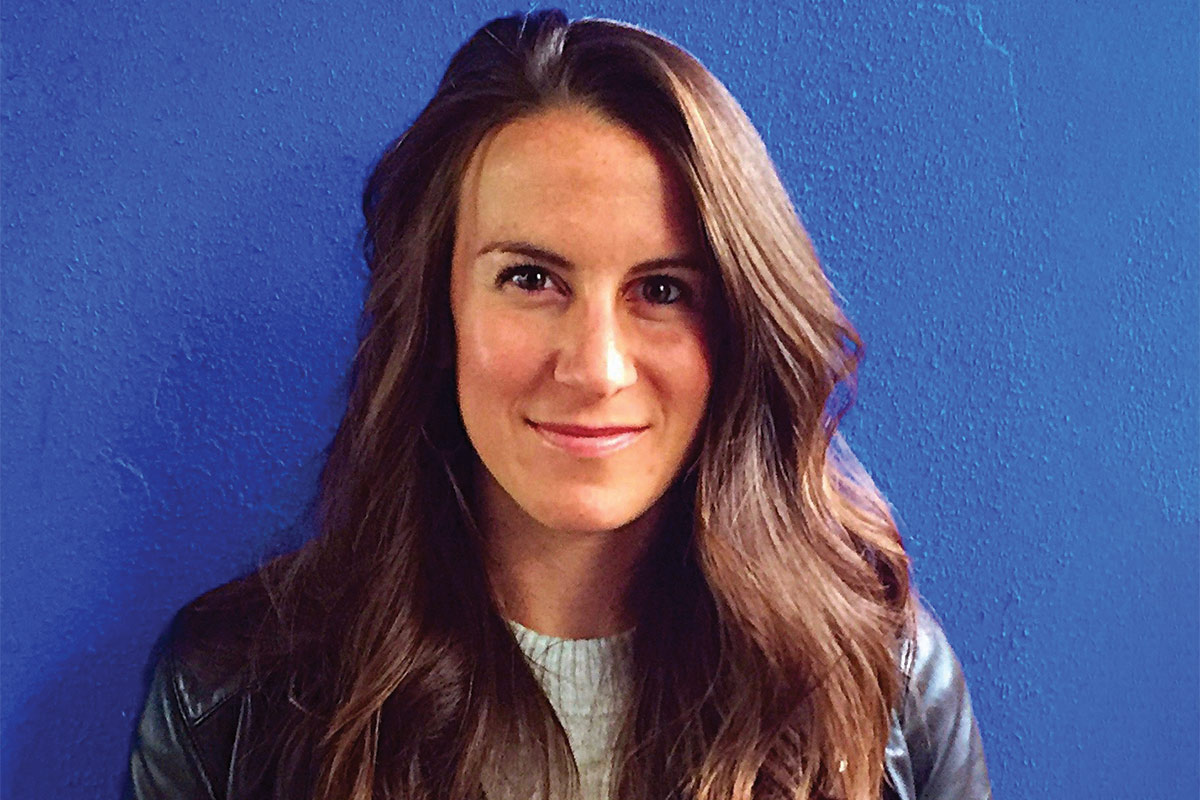

New Scholarship Established in Honor of Becky McBride ’13
Becky passed away April 9, 2020, after a two-year battle with breast cancer, surrounded by her family and grieved by friends. She was 35.
Her parents, Robert and Randye McBride; her brother, Ben, and his wife, Glenny; and numerous friends and colleagues still marvel at her legacy. Born on New Year’s Day 1985 in New York City, Becky grew up in East Windsor, N.J., and attended American University, majoring in philosophy, and minoring in Spanish. After graduating in 2007, she moved to Argentina, where she volunteered at a nonprofit organization, became fluent in Spanish, and decided to focus on practicing law in defense of the underserved, which prompted her entering Brooklyn Law School.
As director of legal services at Atlas:DIY and as a staff attorney at Central American Legal Assistance (CALA), both in New York, native Spanish speakers knew her as Abogada (lawyer) Becky, and staff recall her as often clad in a favorite leather jacket. Her work reunited families, stopped deportations, and was directly responsible for hundreds of newly recognized and soon-to-be citizens in the U.S. That included undocumented minors, who she always referred to by name and treated as unique individuals, not cases.
Her colleagues remember Becky warmly. “She was an example of how to care, how to be responsible, how to laugh,” recalled CALA Director Ann Pilsbury.
The scholarship will be open to second- or third-year students and is based on financial need. Primary consideration will be given to students with a demonstrated interest in not-for-profit immigration law, with particular preference given to those wishing to serve marginalized communities, including refugees.
Brooklyn Law’s Associate Dean of Experiential Education Stacy Caplow stayed in touch and worked with Becky after she graduated. “I take pride in being one of her mentors who supported her dedication to immigration law,” Caplow said. “We who admired and cared about her will miss her tremendously.”
Alphonzo Grant, Jr. ’98 and Isis Sapp-Grant Establish Diversity Recruitment Fund
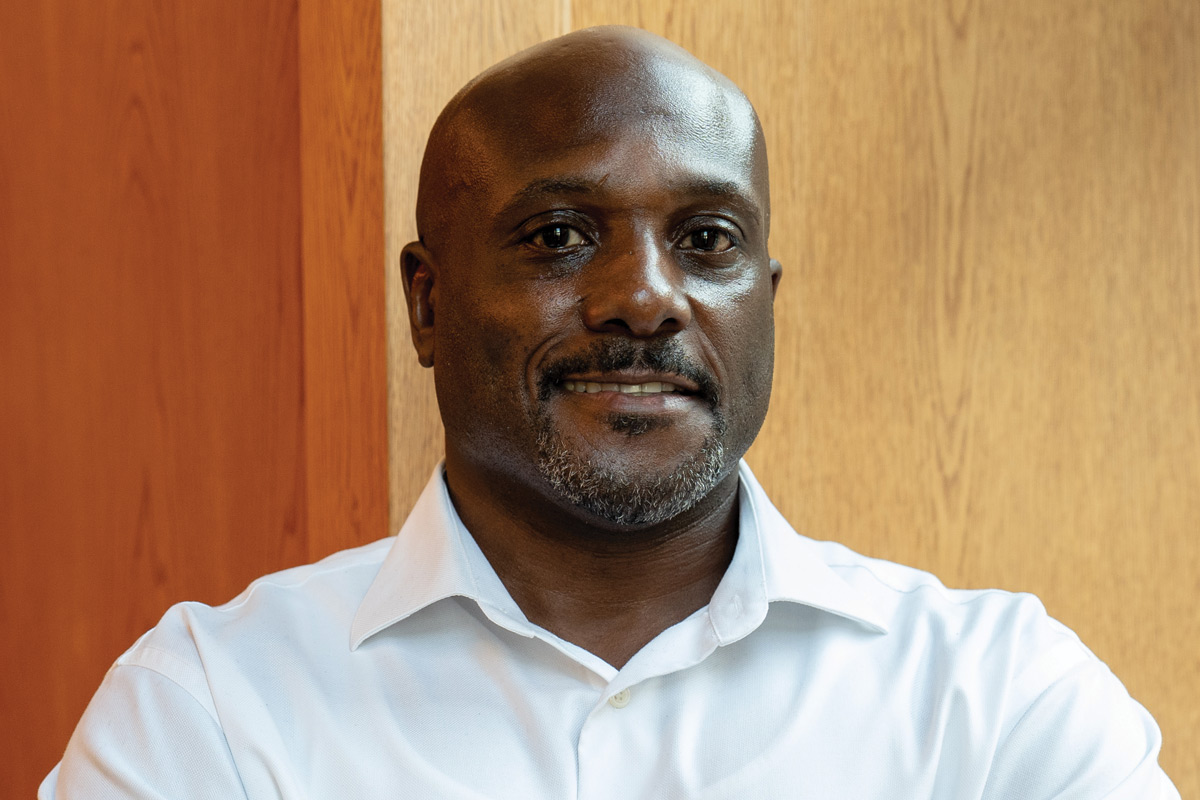

The gift includes a total of $30,000 over three years, offering financial support for students facing not only tuition, but also housing, books, and other living expenses.
Grant, a managing director at Morgan Stanley, is a longtime supporter of the Law School and advocate for civil rights, diversity, and inclusion. Sapp-Grant, a social justice advocate and consultant, is the founder and former executive director of the Youth Empowerment Mission and its award-winning Blossom Program for Girls.
Grant’s own supportive experiences at the Law School inspired his gift.
“I had the ability to attend law school in the evening during my first semester, when I was working full time,” he said. “I was then awarded a scholarship.” A summer Legal Process class with Associate Professor of Legal Writing Emeritus Linda Feldman and then-Associate Dean for Student Affairs Carol Ziegler set him on the path to success, as did a “life-changing mentorship” with then-Adjunct Professor William Kuntz, now a U.S. District Court Judge for the Eastern District of New York. Grant pays it forward by mentoring members of the Black Law Students Association and Latin American Law Students Association.
“I am simply passing on the wisdom and guidance I received during my career journey,” he said.
How Five Alumni Landed at One Boutique Entertainment Law Firm
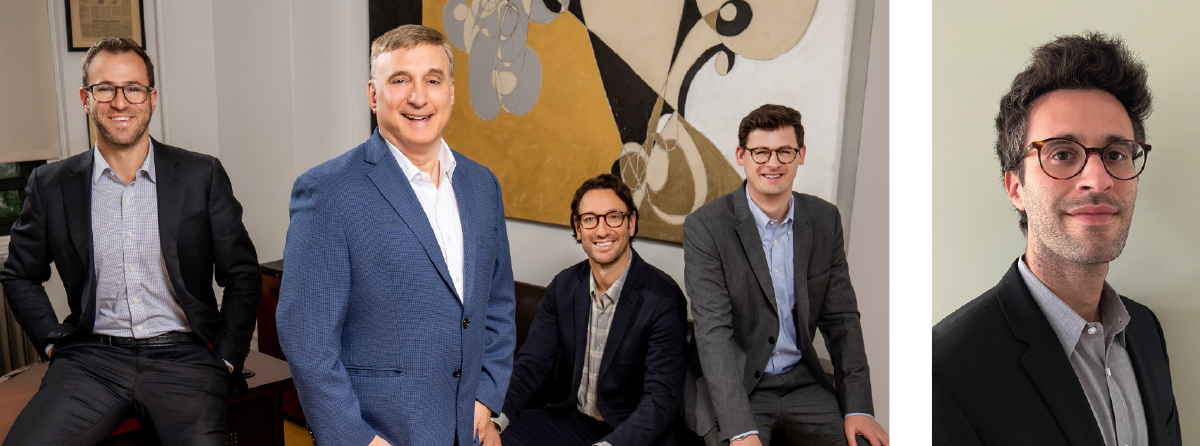
“Generally, there’s no litmus test that if you’re from Brooklyn Law you have better odds of working here,” said Fields, whose two founding partners must also agree on new hires. “But personally, when someone from Brooklyn Law ends up working with us, I like it because I love the Law School; I had a great experience there.”
Other alumni are new partners Cody Brown ’13 and Dan Zupnick ’12; a 2019 Brooklyn Law Entertainment and Sports Law Society alumni honoree, Jason Barth ’13, who went from of counsel to full time; and William H. Williams ’20.
Mentor Program Lets Alumni Share Career Wisdom
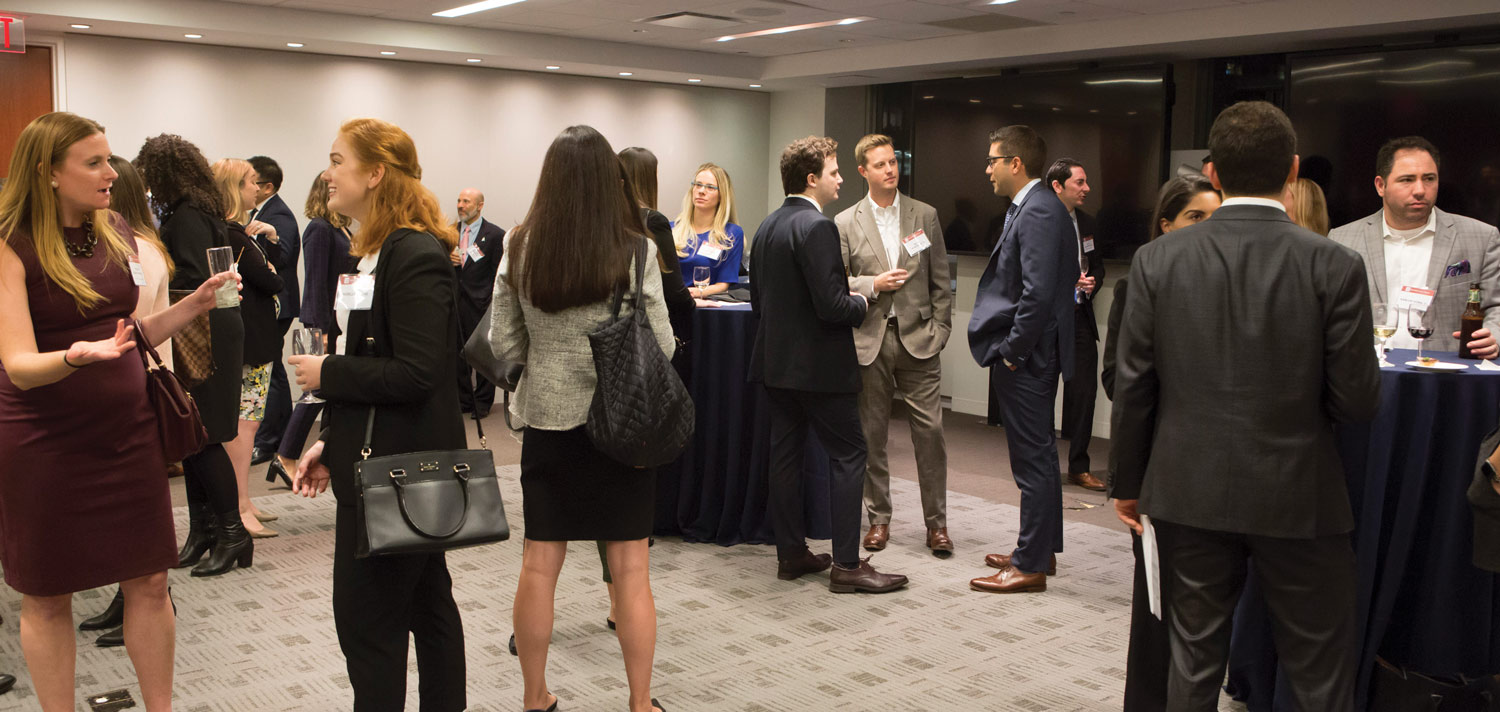
Students, alumni, and recent graduates at a recent Brooklyn Law School Mentor Program gathering.
The Brooklyn Law School Mentor Program, which returned this fall with 144 mentor-mentee matches, gives alumni a chance to answer that clichéd—but ever-interesting—interview question: What advice would you give to your younger self?
Alex Lesman ’05, a Legal Aid Society of New York City staff attorney and a Mentor Program veteran, provides supportive advice to Law School students and recent graduates, but is honest about challenges and disappointments as well.
“I feel strongly that mentoring benefits everyone: the individuals just starting out in a legal career, those doing the mentoring, and everyone in the field,” Lesman said. “Because mentoring helps prepare people to do better work sooner.”
ClassNotes
1959
Carl Steinhouse has authored his 14th book, The War Under the Waves, about the World War II battle against German U-boats fought initially by Britain and then the United States, to ultimately defeat Hitler.
1966
Gene Laks, who specializes in health care law for Barclay Damon, will be listed in the 2023 edition of The Best Lawyers in America.
1968
Joseph C. Wasch , of counsel at Greenspoon Marder in Boca Raton, Fla., was recognized as a 2022 Legal Eagle by the publication Franchise Times.
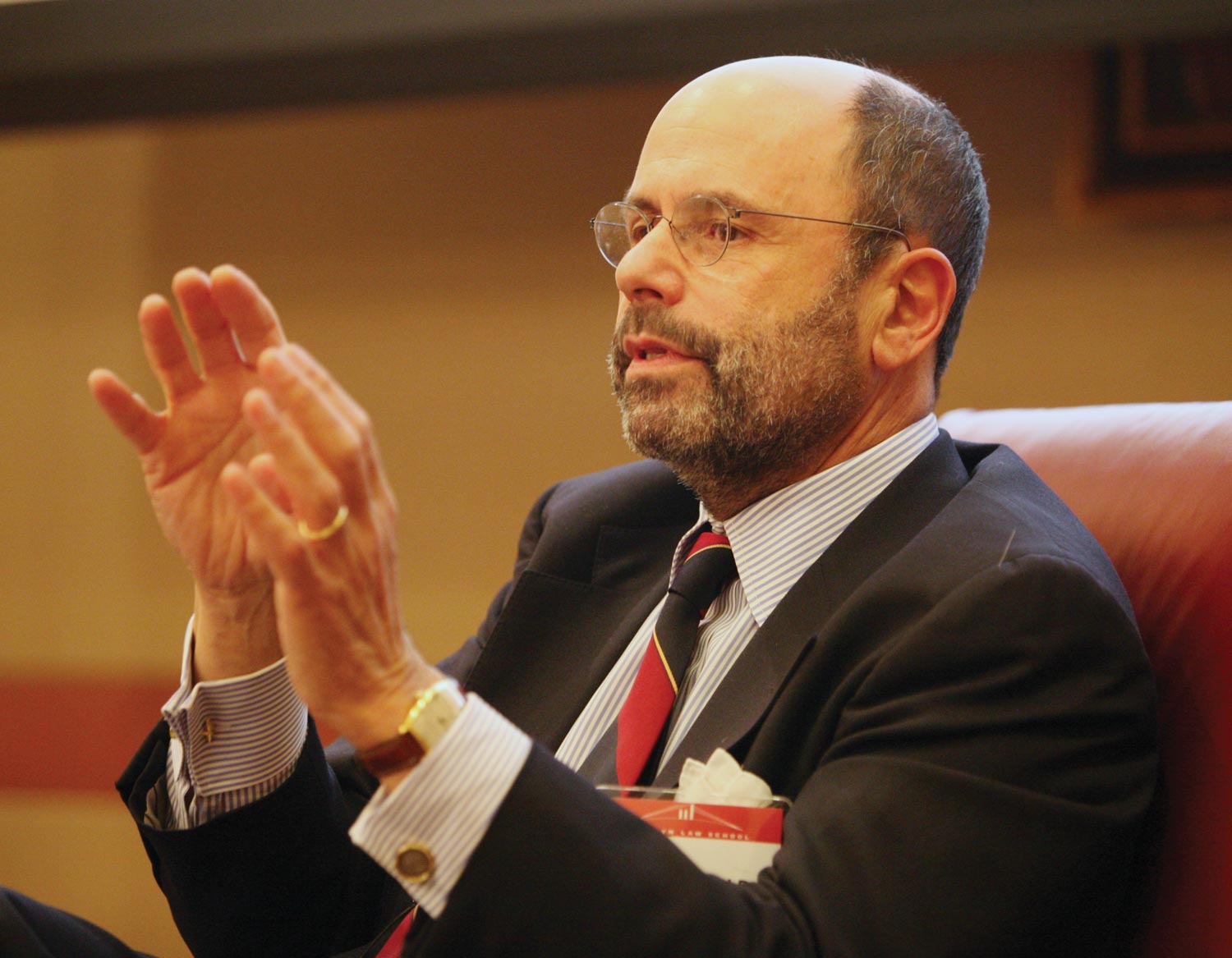
Gerald Shargel ’69
From 2000-04, Shargel was Practitioner-in-Residence at the Law School, teaching Evidence, Criminal Procedure, and Trial Advocacy; mentoring many students; and establishing the Gerald R. Shargel ’69 Scholarship for criminal law students.
During his 40-plus years leading his own firm, and as a partner at Winston & Strawn from 2013 until his retirement in 2018, Shargel distinguished himself as an exceptionally skilled, rigorous, and charismatic attorney who deftly handled a raft of high-profile criminal cases.
“I’m involved in the defense of collars of every color: white-collar, gray-collar, blue-collar,” Shargel once told a reporter. “I represent doctors, lawyers, politicians, state senators, congressmen.”

Closing


“Flourishing” in the Field of Law
What does it mean to be a “flourishing lawyer”?
In studying applied positive psychology with the field’s founder, Martin E.P. Seligman, I read his book, titled Flourish. In my studies, I dove more deeply into the concept of flourishing, aspiring to apply it to the legal profession. Flourishing is not just feeling good, which psychologists call “hedonic well-being,” but includes “eudaimonia,” a Greek term that means “functioning well.” Flourishing isn’t just smiling all the time and having a good day. We all know that’s unrealistic. To function well, we set up cognitive, emotional, and physical systems to remind us that, when we do encounter stress or anxiety or fear, we remember that we’ve been through situations like that before and we are equipped with resources to tackle each problem. We learn to trust our systems and ride out the rise and fall of stress symptoms to get through inevitable rough times. Just as athletes and performers train in multiple dimensions before they step into the performance arena, we can do the same.
Back Cover
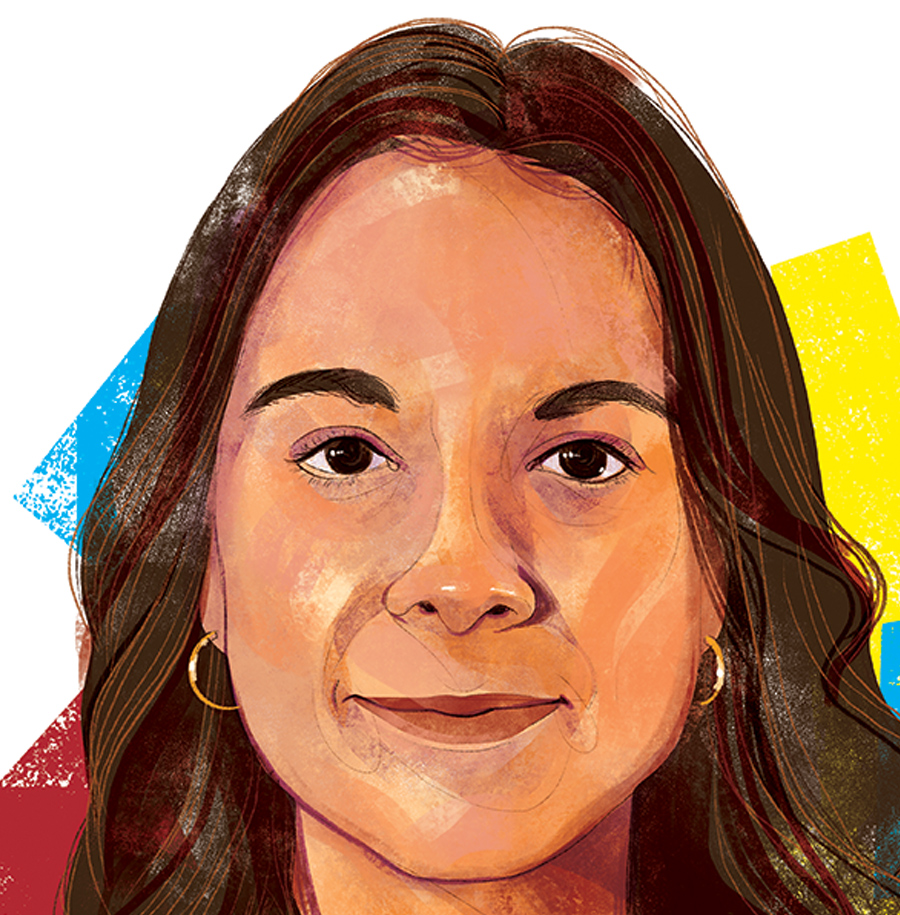
Also inside:
rock & Roll hall of fame inducts first lawyer
FLOURISHING IN THE FIELD OF LAW
How to prioritize your own well-being





